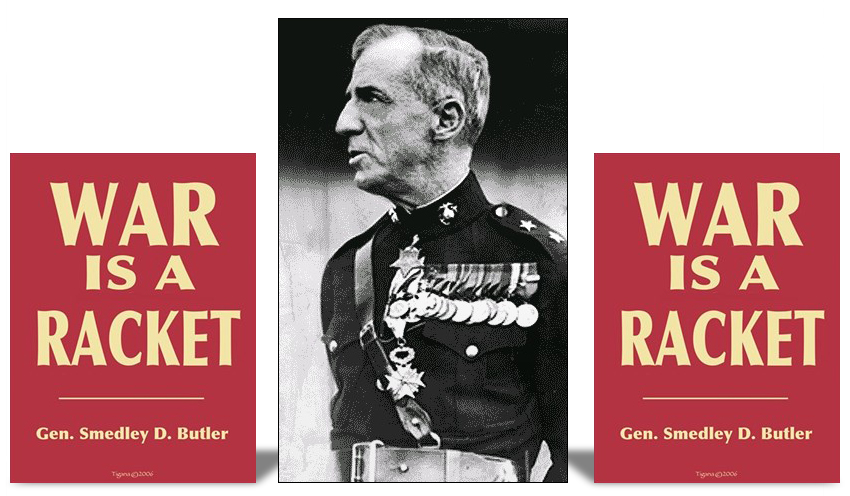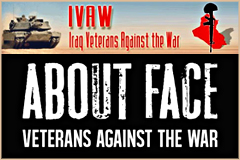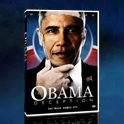welcome
|
||||||||||||||||||||
______WAR______ These 127 essays, although organized under seven headings, have one underlying theme: opposition
to the warfare state that robs us of our liberty, our money, and in some cases our life. Conservatives who decry
the welfare state while supporting the warfare state are terribly inconsistent. The two are inseparable.
Libertarians who are opposed to war on principle, but support the state’s bogus “war on terrorism,” even as they
remain silent about the U.S. global empire, are likewise contradictory. In chapter 1, “War and Peace,” the evils of war and warmongers and the benefits of peace are examined. In chapter 2, “The Military,” the evils of standing armies and militarism are discussed, including a critical look at the U.S. military. In chapter 3, “The War in Iraq,” the wickedness of the Iraq War is exposed. In chapter 4, “World War II,” the “good war” is shown to be not so good after all. In chapter 5, “Other Wars,” the evils of war and the warfare state are chronicled in specific wars: the Crimean War (1854–1856), the Russo-Japanese War (1904–1905), World War I (1914–1918), the Persian Gulf War (1990–1991), and the war in Afghanistan (2001–). In chapter 6, “The U.S. Global Empire,” the beginnings, growth, extent, nature, and consequences of the U.S. empire of bases and troops are revealed and critiqued. In chapter 7, “U.S. Foreign Policy,” the belligerence, recklessness, and follies of U.S. foreign policy are laid bare. Chapter One - War and Peace ______[p1]
Listen to "Christianity and WAR" on Spreaker.
WAR
Eight Facts About Iraq
The Bush administration, its accomplices in the news media, and the conservative talk show hacks who do the bidding of the Republican party have sold America a bill of goods. The invasion of Iraq was justified, we have been led to believe, because Saddam Hussein was the reincarnation of Adolph Hitler, Iraq was in the position of Germany on the eve of World War II, and the “elite” Republican Guard was the equivalent of the German Wehrmacht. According to the president himself: “We will end a brutal regime, whose aggression and weapons of mass destruction make it a unique threat to the world.” Right wing Christians too, who ought to know better, have also been duped because of their misplaced trust in the state just because it is currently controlled by the Republican party (the same Republican party that is expanding government at a rate not seen since the Democratic administrations of Lyndon Johnson and Franklin Roosevelt). Located at the northern tip of the Persian Gulf, and encompassing the land of ancient Mesopotamia, as well as the biblical Tigris and Euphrates rivers, the country of Iraq, which until recently could not be located on a map by most Americans, is now the focus of all Americans. But because most Americans are woefully ignorant of history, and especially the history of U.S. intervention into other countries; and because most Christians are just as ignorant of history, and especially Christians who spend all their time believing what they read in the newspaper, hear on the radio, and see on television, some facts about Iraq are in order. Fact Number 1: There was no country of Iraq until it was created by the British in 1920. In 1534 the Ottoman Turks conquered the area of what is now Iraq. Here the Ottoman empire ruled until its defeat in World War I because Turkey sided with the Central powers. After World War I, the French and British divided up the formerly Ottoman-controlled lands in the Middle East. France was given a League of Nations mandate over Syria and Lebanon; Great Britain was given the same over Palestine, Transjordan, and Iraq. The modern state of Iraq was created out of the three Ottoman provinces of Basra, Mosul, and Baghdad. The defeat of the Turks may have brought to an end the Ottoman empire, but it began a century of Western imperialism. Fact Number 2: The United States already sponsored two previous regime changes in Iraq. Under their League of Nations mandate, the British installed King Faisal as the ruler of Iraq. But even after its independence, Iraq was still controlled by Britain. Faisal’s dynasty lasted until his grandson Faisal II was executed in a 1958 coup. The Hitler in Iraq in the early 1960s was Abd al-Karim Qasim. After deposing the Western-allied Iraqi monarchy in 1958, Qasim was seen by the U.S. as a counter to Gamal Abdel Nassar of Egypt. But after he was perceived as too much of a threat to Western oil interests, Qasim was killed in February 1963 in a CIA-sponsored coup by the anti-Communist Baath party. American firms soon began doing business with Baghdad. All was not well, however, in the Baath party, for in 1968 an internal coup brought to power General Ahmad Hassan al-Bakr, who was succeeded by Saddam Hussein in 1979. These regime changes in Iraq were both accompanied by bloody reprisals. Fact Number 3: Saddam Hussein was an ally of the United States until the first Persian Gulf War. The U.S.-Hussein connection actually goes all the way back to the late 1950s. Hussein was part of a group that tried to assassinate Abd al-Karim Qasim after he seized power in 1958. Fleeing Iraq, he eventually settled in Cairo, Egypt, where he was courted by the CIA. During the 1980s, when Iraq was at war with Iran, military intelligence was provided to Iraq because the United States sought to do whatever was necessary to prevent Iraq from losing its war with Iran. The U.S. problem with Iran stemmed from decades of American intervention that backfired when radical Shiite Muslims overthrew the Shah and installed the Ayatollah Khomeini. The United States has a bad habit of collaborating with tyrants who later come back to bite us. Who can forget that Joseph Stalin, one of the bloodiest killers who ever lived, was our “ally” in World War II? Fact Number 4: Iraq got its “weapons of mass destruction” from the United States. This started after the Baath party coup of 1963, when the U.S. sent arms to the new regime. But during the Iran-Iraq War of the 1980s, when, under the successive administrations of Reagan and Bush I, Saddam Hussein was our ally against Iran, it was not just arms that were provided to Iraq. According to the 1992 U.S. Senate committee report on U.S. Chemical and Biological Warfare-Related Dual-Use Exports to Iraq, “the United States provided the government of Iraq with u2018dual use’ licensed materials which assisted in the development of Iraqi chemical, biological and missile-system programs.” This included anthrax, VX nerve gas, West Nile fever germs, botulism, salmonella, and E coli. Fact Number 5: Iraq was a liberal Muslim state. Iraq is made up of three major groups: the Kurds, the Shiites, and the Sunnis. The Shiites, which are in the majority, are the more radical Muslims. The ruling Baath party was more closely associated with the more moderate Sunnis, which make up about 35 percent of the population. Unlike Saudi Arabia, Iran, and most other Muslim states, Iraq was not controlled by a fundamentalist Muslim government, something that is now a possibility. One could even purchase a drink in Baghdad. The Baath government tolerated both Jews and Christians, something not to be seen in Muslim countries like Indonesia, Turkey, and Iran. Fact Number 6: Iraq was not responsible for the 9-11 attacks on the United States. Many Americans who supported the war with Iraq did so because they were led to believe that the U.S. was retaliating for the terrorist attacks on September 11. Yet, none of the hijackers of the airplanes on September 11 were from Iraq (or Afghanistan). They were mainly from Saudi Arabia, our supposed Muslim ally in the Middle East. No connection has ever been proved between Iraq and al-Qaeda or Saddam Hussein and Osama bin Laden. There is even evidence that the invasion of Iraq was planned before the September 11 attacks. A September 2000 document issued by the Project for the New American Century (PNAC) entitled “Rebuilding America’s Defenses: Strategies, Forces and Resources For A New Century,” drawn up by Dick Cheney, Donald Rumsfeld, and Paul Wolfowitz, shows that Bush’s cabinet intended to take military control of the Persian Gulf region regardless of whether Saddam Hussein was in power. Fact Number 7: Iraq was not a threat to the United States. Although Bush’s initial justification for war was that Iraq was a “threat to the United Nations” (certainly no reason for the U.S. to go to war), this was soon shifted to Iraq being a threat to the United States. But even though Secretary of Defense Donald Rumsfeld insisted that “no terrorist state poses a greater and more immediate threat to the security of our people and the stability of the world than the regime of Saddam Hussein in Iraq,” the condition of Iraq said otherwise. Not only was Iraq’s army considerably weaker than it was during the first Persian Gulf War – a war in which Iraq only managed to kill 148 Americans – but Iraq had no navy or air force. Iraq’s economy was in ruin after a decade of sanctions – sanctions that destroyed its water supplies. The GNP of Iraq was not even 15 percent of that of the state of Washington. The only time in history when Iraq did actually attack the United States – an Iraqi warplane attacked a U.S. ship in the Persian Gulf in 1987 resulting in the killing of dozens of U.S. sailors – we did nothing because Iraq apologized for its “mistake.” No, the greatest threat to freedoms of the American people is not Iraq. The greatest threat to the freedoms of the American people is not some country six thousand miles away; it is our own government. How is it that in a country with such a heritage of individual liberty like the United States, one can smoke in a restaurant in Baghdad, but not in Manhattan? How is it that in a country with a Christian heritage like the United States, one can buy a gun in Baghdad, but not in Washington D. C.? If Iraq’s neighboring countries did not feel the need to send troops to Baghdad, then why did we? Fact Number 8: Iraq is the Mideast’s second largest oil producer. Although this is a fact that everyone knows, it is downplayed by all proponents of the war with Iraq. But if oil has nothing to do with the U.S. intervening in Iraq, then why hasn’t the U.S. intervened in Sudan, where 2 million Christians have been killed during the past decade? What about the persecution of Christians in Indonesia? Why hasn’t the U.S. intervened in Zimbabwe, where the Marxist tyrant Robert Mugabe has been confiscating the country’s farmland? Why has Fidel Castro – 90 miles away from our shores – been untouched for 40 years? Why didn’t the U.S. instigate a “regime change” when Idi Amin was killing thousands of his own black people in Uganda in the 1970s? Why didn’t the U.S. instigate a “regime change” when the Tutsis were slaughtered by the Hutu government of Rwanda in 1994? Would things have been different if Sudan, Indonesia, Zimbabwe, Cuba, Uganda, and Rwanda had significant oil reserves? These sobering facts, unknown to Americans who get all their news from ABC, CBS, NBC, CNN, FOX, and CNBC, should cause every citizen, and especially every Christian, to question the motives of the state the next time it is insisted that we should invade another country. They should also cause all Americans to question the necessity of the United States maintaining 184 military bases in over 100 countries around the world. God never appointed the United States to be the world’s policeman.
War on His Mind
It has been just over two years since President Bush — in commander-in-chief mode — landed on the
USS Lincoln and spoke these words in front of a “Mission Accomplished” banner: Major combat operations in Iraq have
ended. In the Battle of Iraq, the United States and our allies have prevailed. And now our coalition is engaged in
securing and reconstructing that country. But the mission was not accomplished, for out of the 1,614 American
combat deaths in Iraq, 1,477 occurred after Bush’s “Mission Accomplished” speech. How many more Americans must die
before Bush’s “mission” is accomplished? When the number of Americans killed in Iraq surpassed the 1,000 mark in
September of 2004, Bush said of the families
of the dead during a campaign rally: “My promise to them is that we will complete the mission so that their
child or their husband or wife has not died in vain.” Then in January of 2005, Bush invoked his mission once again:
“American troops will be leaving as quickly as possible, but they won’t be leaving until we have completed our
mission.” But how many more Americans must die before Bush’s “mission” is completed? As long as Bush is in office,
there will be no “mission accomplished” or “mission completed.” Like his predecessors Lincoln, Wilson, Roosevelt,
and Johnson, Bush is now a war president — and seems to relish his role in this elite society. It has been a little
over a year now since Bush uttered the following words during an interview in the Oval Office with Tim Russert for
NBC’s “Meet the Press” that was broadcast on February 8, 2004:
I’m a war president. I make decisions here in the Oval Office in foreign-policy matters with war on my mind. Since
Bush made this admission, I have written four articles in which I mentioned the number of American troops that have
been killed in Bush’s “splendid little war” against Iraq. On July 9, 2004, in “The Horrors of War,” I related that before the phony transfer
of power to the Iraqis on June 28, 855 American troops had died. On November 5, 2004, in “For Whom Would Jesus Vote,” I pointed out that Bush’s
undeclared, unconstitutional, immoral war had resulted in the deaths of over 1,100 American soldiers. On May 2,
2005, in “What’s Wrong with the U.S. Global Empire?” I
said that there were 1,569 military deaths in Iraq. And most recently, on May 9, 2005, in “The Warmonger’s Beatitudes,” I used the figure of 1,601 dead
Americans. The death count is now up to 1,614, with no end in
sight. At the rate things are going, by the time Bush’s second term comes to a close, the number of American
serviceman killed in Iraq will surpass the number of Americans killed in the World Trade Center attacks. Depending
on the source of your information,
the official death toll in the New York City terrorist attacks was 2,752 (NYC), 2,774 (AP), or 2,784 (USA Today).
Since some of those killed were foreigners, the actual number of Americans killed will be less than any of the
above figures. Perhaps it is time for President Bush to have American soldiers on his mind instead of war on his
mind. American soldiers that could be guarding our borders, patrolling our coasts, and actually defending us from
terrorist attacks instead of dying halfway around the world trying to impose American-style democracy on a country
and a people that have never been so inclined. It is the American people that need to have war on their mind. How
many more billions of dollars will have to be spent before the American people demand an end to this obscene waste
of their money? How much higher does the body count have to go before the American people are outraged enough to
demand an end to this senseless war? Every new casualty should be met with increasing contempt for the state and
its wars. Bringing democracy to Iraq and ridding the country of Saddam Hussein is not worth the life of one
American. What kind of government they have and who is to be their “leader” is the business of the Iraqi people,
not the United States. I continue to be amazed that those who oppose the war and don’t want to see the blood of
Americans shed on foreign soil are labeled as un-patriotic and anti-American. Real patriots don’t want to see their
country hated because of interventionism and militarism. Real patriots don’t want to see even one American used as
cannon fodder for the state. Real patriots want their country to be admired not scorned. And yet, Americans
continue to support and make apologies for the state and its wars. In spite of growing opposition to the war in
Iraq, I am not very optimistic about the American people as a whole demanding the complete withdrawal of American
troops and American influence from Iraq. And here are some reasons why. First, oil: As long as drilling for oil in
the United States is demonized and there is oil in the Middle East, the United States can be counted on to
intervene in Iraq and everywhere else in the Middle East. Second, Vietnam: The deaths of 58,000 young American men,
the wounding of 304,000 more, and the permanent disabling of 75,000 of those wounded — all in the jungles of
Vietnam — should have forever turned the American people away from supporting another foreign war. It didn’t.
Third, September 11th: As long as many Americans continue to believe that Iraq was behind the September 11th
attacks (a belief that even the president
does not hold), there will never be sufficient enough outrage at anything that happens in Iraq. Fourth, the
U.S. empire: The stationing of U.S. troops abroad is so pervasive (we now have troops in 150 different regions of the world), and has gone on for so
long (we still have troops in Japan and Germany even though WWII ended in 1945), that the American people don’t
seem to mind when the latest overseas U.S. military adventure is announced. Fifth, the military: Abu Ghraib
notwithstanding, the military is still held in high esteem by too many of the American people even though very
little of what the military actually does has anything to do with defending the country. Sixth, the Religious
Right: Conservative Christians, who would know better if they spent as much time reading their Bible and studying
history as they did reading the Weekly Standard and listening to Republican propaganda from their pulpits, should
be the first to denounce any new foreign war that will lead to the deaths of thousands of innocent people. Yet,
many of them continue to defend anything the president does with the lame excuse that “he is a Christian.” What is
really tragic about this president is that the things he thinks of when war is not on his mind are things like
faith-based welfare schemes, the Medicare prescription drug benefit, steel tariffs, and Social Security
“privatization.” It would be nice to have a president with the protection of life, liberty, and property on his
mind. A president who actually followed the Constitution he swore to uphold, like “the last good Democrat,” Grover Cleveland.
It Is a Simple Matter
Why are U.S. troops still in Iraq? After all the lies about this war have been exposed, one would think that the American people would be shouting from the housetops for an end to the senseless loss of life of young American soldiers, now numbering 1,827. So why are U.S. troops still in Iraq? The excuse often given when someone doesn’t want to do something is that the action in question is just too complicated to be carried out. The war in Iraq is no different. Douglas Feith, the Undersecretary of Defense for Policy, in a recent interview on NPR, said that withdrawal from Iraq is “not a simple matter.” Feith, who will shortly be leaving his post to spend more time with his family, follows Secretary of Defense Donald Rumsfeld and Deputy Defense Secretary Paul Wolfowitz in civilian authority at the Pentagon, and is considered to be a principal architect of U.S. postwar strategy in Iraq. Feith has not been without his critics, even within the establishment. Retired Army general Tommy Franks called him “the stupidest guy on the face of the Earth.” But, Mr. Feith, it is a simple matter. Stop making excuses for the fact that you don’t want U.S. troops to leave Iraq. The withdrawal of all U.S. and coalition forces from Iraq is a simple matter. And don’t dismiss me as an idealist with my head in the clouds. I am not naïve enough to think that the entire U.S. military could leave Iraq tomorrow. However, a journey of a thousand miles begins with a single step. There is no one correct plan to withdraw from Iraq. But in my opinion, to withdraw the U.S. military from Iraq in not only a safe, reasonable, and timely manner, but also in a just manner, the following simple steps should be taken. Step one: Announce to Iraq that our invasion was a horrible mistake, as was our intervention in the region for the last fifty years. Tell Iraq that we intend to withdraw every American soldier as soon as possible. Apologize for the tens of thousands of Iraqis that were killed by our bullets, bombs, or sanctions. Step two: Stop all killing, bombing, patrols, arrests, imprisonments, and interrogations. Maintain a defensive position until exiting the country. Step three: Perform the logistics necessary to leave the country. Tell the troops to start packing. Step four: Apologize to our troops for sending them to Iraq, and especially our wounded. Apologize to the families of all our soldiers killed in Iraq. Release from confinement all U.S. soldiers imprisoned for refusing to fight, like Sgt. Kevin Benderman. Step five: Announce to every country that was a member of our “coalition,” and especially to Great Britain, that they made a horrible mistake in following our lead in invading Iraq. Tell them that they should immediately withdraw all their forces from Iraq. Let them know that we intend to withdraw as soon as possible and that if they choose to remain in Iraq then they do so without our protection. The United States should also apologize to every country that it demonized for not supporting our invasion of Iraq. Step six: Announce to Iraq that there will be no future military interventions or interference with the government of the country. If the government of Iraq wants to hire former members of the U.S. military to train their military and police forces or contractors to rebuild the country then that is their business. No U.S. troops will be stationed in Iraq to guard Halliburton employees. Americans who work in Iraq will do so at their own risk. Offer to purchase as much oil as Iraq can supply to give the country funds to rebuild its infrastructure. Step seven: Use every available truck, plane, and ship to get the troops out. Squad by squad, platoon by platoon, company by company, battalion by battalion, squadron by squadron, brigade by brigade, division by division, corps by corps — it doesn’t matter, just get the troops out. Once these seven steps are carried out, there are two other steps that those of us who want to return to the nonintervention policy of the Founding Fathers would like to see taken: Step eight: Put the world on notice — withdrawal from your country is next.
Mr. Feith may not agree with these steps. He may think that they could not be carried out. He may even dismiss me as a simpleton. But one thing is certain; these steps would not result in the deaths of any more American soldiers — unlike any of the plans circulating in the Bush administration.
It's Not My War!
“Yes, this is Bush’s war, but it is also America’s war, our war.” ~ Pat Buchanan If there is anything this war is not, it is not my war. I have opposed it from the beginning. I have denounced it from the beginning. I have never wavered in my disagreement with the president who instigated it, my disgust for the Congressmen who funded it, my loathing for the conservatives who promoted it, my abhorrence of the Christians who defended it, and my pity for the soldiers who were duped by military recruiters to participate in it. But I am not alone. I know that there are hundreds, thousands, and perhaps millions of Americans who have condemned the Iraq war from the beginning. The difference between my opposition to the war and that of many others is that my opposition is based on principle — not because Bush lied about Saddam Hussein’s intentions, weapons, and al-Qaeda connection. There is no question that this is Bush’s war, but he is not alone. There is no shortage of conservative talk show hosts, congressmen, pundits, politicians, political appointees, and Christian “leaders” who have not only defended Bush and his war, but continue to defend him and it despite growing dissatisfaction with the way things are going in Iraq. The body count of dead American soldiers, now over 1,900, does not seem to bother this diverse group of conservatives much at all. Conservatives who denounced Clinton’s abuse of the military when he ordered cruise missile strikes on Afghanistan and Sudan during the Monica Lewinsky fiasco would again be calling for Clinton’s impeachment if 1,900 American soldiers died on his watch. The typical conservative is not opposed to war at all as long as it is launched by a Republican president who claims to be one of them. But is it America’s war? Buchanan himself cites a Newsweek report that “support for Bush’s handling of the war has fallen below 40%, to 34%, with 61% now disapproving of his leadership.” This is the American government’s war, but it is not the American people’s war. The same is true of any of our government’s wars. If we were invaded by foreign troops, an armed American populace (except in cities with draconian gun control laws) would rise up to repel the invaders. The U.S. military would not be of much help since so many of our troops are overseas. I am very surprised that this statement by Buchanan has only garnered a little attention. He made the comments in reply to Democratic strategist Bob Shrum on the MSNBC Hardblogger site. Buchanan also said this: And while American soldiers have not lost a single battle, we are not winning the war. But this, it seems to me, is not cause for gloating or mockery of the president. The question is: What do we do now? How do we bring our troops home with honor, and leave behind in Iraq something that does not dishonor their sacrifice. If running for the exit ramp would do that, I would favor it, but I do not believe it. Mockery would be too good for this president. Bush deserves far worse. There is no way to bring our troops home with honor. The damage has already been done. The death and destruction that our troops have wrought in Iraq has dishonored America for years to come. The best thing U.S. troops could do is run for the “exit ramp,” as long as it is done in a safe, reasonable, timely, and just manner, as I have described in my exit plan.
But it’s not my war!
Do They Think It's Worth It?
The work in Iraq is difficult and it is dangerous. Like most Americans, I see the images of violence and bloodshed. Every picture is horrifying, and the suffering is real. Amid all this violence, I know Americans ask the question: Is the sacrifice worth it? It is worth it, and it is vital to the future security of our country. ~ President Bush The president uttered these words before a friendly audience at Fort Bragg, North Carolina — not in front of a
crowd of wounded U.S. troops. The official number of these troops is 16,155, although unofficial estimates range up to almost 50,000. It is easy for Mr. Bush and supporters of this war, both inside and
outside the government, to say that it’s worth it. But perhaps we should get another opinion. Why don’t we ask the
wounded U.S. troops if they think it’s worth it? This twenty-year-old young man was trapped for twenty minutes in a
fiery ammunition truck in Iraq. He was left with disfiguring burns on his face, head, arms and legs. This is what
he looks like after more than two dozen surgeries. Does he think it’s worth it? For the rest of his life kids will
laugh at him and call him Frankenstein or a freak. For the rest of his life he will have to look at his face in the
mirror in the morning. For the rest of his life people will silently stare at him — thinking that he reminds them
of someone they saw in a horror movie. Finding a girlfriend or even a job will be a difficult thing. Does he think
the war in Iraq is worth the price of his face? This soldier lost his left hand and will probably lose his right
arm. Does he think it’s worth it? For the rest of his life he will not be able to open a door or a can of coke. For
the rest of his life he will not be able to go to the bathroom by himself. For the rest of his life he will not be
able to turn on the radio or type an e-mail. Picking up his kids, if he ever has any, will be very difficult. Does
he think the war in Iraq is worth the price of his hands? This soldier will have to have his feet removed. Does he
think it’s worth it? For the rest of his life he will not be able to walk or drive a car. For the rest of his life
he will not be able to participate in any sports. For the rest of his life he will be confined to a wheelchair.
Running and playing with his kids, if he ever has any, will be impossible. Does he think the war in Iraq is worth
the price of his feet? The Pentagon frowns on photographers and the press from seeing, watching, or taking photos
of wounded U.S. troops arriving from Iraq via Ramstein Air Base in Germany and being transported to Walter Reed
Army Medical Center and Bethesda Naval Medical Center. What if the American people were allowed to see thousands of
pictures of wounded U.S. troops instead of just the three I have included here? What if they could see the grieving
parents, spouses, children, and friends that God sees? How quickly public opinion would be turned against Bush and
his war! A month before Bush made his Fort Bragg speech in which he said the Iraq war was worth it, a CNN/USA Today/Gallup poll recorded that 57 percent of
those polled said they did not believe it was worth going to war in Iraq, versus 41 percent who said it was. As
more and more Americans conclude that the war is not worth it, both in lives and in dollars, Bush’s approval rating goes down further
and further. We can only hope that these numbers continue on their upward and downward paths until the former
number reaches one hundred and the latter number reaches zero. But until that day comes, how many more faceless,
handless, and feetless soldiers will have to suffer? There is a group of U.S. troops that we can’t ask about the
war being worth it. They died for a lie. They will never enjoy the finer things in life like eating a good meal,
walking on the beach, visiting a museum, or relaxing under a shade tree. They will no longer know the love of a
parent, a spouse, or a child. They will never have any more children and will never see their grandchildren. They
will never buy a house, retire from a job, or take a vacation. They’re dead Mr. Bush. Do they think the war in Iraq
was worth their life?
Is Anyone Listening?
They should know better. Supporters of this war, apologists for this war, defenders of this war,
participants in this war — they should all know better. The evidence is there, but is anyone listening? Democrats,
Republicans, Libertarians, Objectivists — they should know better. Catholics, Protestants, Evangelicals,
Fundamentalists, Jews — they should know better. Ministers, teachers, doctors, managers, fast food workers,
housewives should know better. Marines, soldiers, sailors, airmen, guardsmen, and reservists — they should know
better. Flag wavers, patriots, veterans, yellow ribbon wearers, “God and country” and “God bless America”
Christians — they should know better. All Americans should know better. The evidence is there, but is anyone
listening? They have the word of Pentagon insiders. They have the word of Bush administration insiders. They have
the word of the Army War College. They have the word of army generals. They have the word of members of Congress.
They have the word of the Founding Fathers. They have the word of war veterans. They have the word of Iraq war
veterans. They have the word of the vice president. They even have the word of the president himself. The evidence
is there, but is anyone listening? Karen
Kwiatkowski retired as a USAF lieutenant colonel after spending her final four and a half years working at
the Pentagon. She accelerated her retirement “because of the ethical difficulties brought on by witnessing the
misuse of intelligence in order to support an agenda for an unnecessary, unwarranted war of choice against Iraq.”
She describes the current U.S. military and civilian leadership as “politicized, emasculated, obedient to the
bureaucracy and ignorant of the Constitution.” Is anyone listening to Colonel Kwiatkowski? Lawrence Wilkerson, a former colonel in the U.S.
Army, a decorated Vietnam vet, and a life-long Republican who served as chief of staff to former Secretary of State
Colin Powell, has recently stated that Powell’s February 2003 speech before the United Nations that sought to
justify the impending war against Iraq was “a hoax on the American people, the international community, and the
United Nations Security Council.” He further stated that “there were major doubts inside the intelligence community
about everything that was being said about the Iraq threat, even as Powell’s speech was being planned and
delivered.” Jeffrey Record,
a professor in the Department of Strategy and International Security at the U.S. Air Force’s Air War College in
Montgomery, Alabama, and former professional staff member of the Senate Armed Services Committee, writes in
Bounding the Global War on
Terrorism, published by the Strategic Studies Institute of the Army War College, that the war in Iraq “has
created a new front in the Middle East for Islamic terrorism and diverted attention and resources away from
securing the American homeland against further assault by an undeterrable al-Qaeda.” The nature and parameters
of the global war on terror (GWOT) “remain frustratingly unclear.” The declared objectives of the GWOT are
“unrealistic.” The goals of the GWOT are “politically, fiscally, and militarily unsustainable.” The GWOT is
“strategically unfocused, promises much more than it can deliver, and threatens to dissipate scarce U.S.
military and other means over too many ends.” Is anyone listening to Professor Record? Lieutenant General
William Odom (Ret.) calls the
war in Iraq “the greatest strategic disaster in our history, not in terms of its present body count, but rather
because of its radiating consequences for the region and the world.” Invading Iraq “was never in the U.S.’
interests and has not become so.” Brigadier General Andrew Gatsis (Ret.), who was awarded
numerous medals for bravery during the Korean and Vietnam Wars, says about the war: We never should have gone in
there in the first place since we weren’t immediately threatened. There were no weapons of mass destruction;
Saddam Hussein’s regime had no connection to Osama bin Laden and al-Qaeda, and wasn’t responsible for the
attacks on the Pentagon and the World Trade Center; and there wasn’t any evidence to back up the claim that Iraq
was building nuclear weapons capability. All the reasons given by the administration to justify this war have
been shown to be false. We invaded a country that posed no threat to us. What’s different about what we have
done in Iraq and what Hitler did when he sent his forces into Czechoslovakia in 1939? This war in Iraq has
already cost the lives of 2,200 Americans, wounded over 15,000 more, and left at least 30,000 Iraqis dead, most
of whom were non-combatants caught in crossfires or victimized by Islamist terrorists. And look at the billions
of dollars being poured into this flawed effort. It saddens me to see all of this happen to our troops — and all
for an unjust cause. Is anyone listening to these generals? Representative John Murtha (D-PA), a decorated
Marine combat veteran and the first Vietnam veteran elected to Congress, has recently called for the withdrawal
of American forces from Iraq, concluding that the war has increased both terrorism and instability in the Middle
East. He now terms the
war “a flawed policy wrapped in illusion.” On the Republican side of the aisle, there is the heroic
Representative Ron Paul (R-TX), an Air Force veteran who has opposed the war from the beginning. Is anyone listening to these congressmen?
The Founding Fathers of this country issued numerous warnings about the dangers of wars. We know that Thomas
Jefferson said: “Never was so much false arithmetic employed on any subject, as that which has been employed to
persuade nations that it is their interest to go to war.” But let’s hear the “father of the Constitution,”
James Madison, on how the state
uses war to strip its citizens of their liberties: If tyranny and oppression come to this land, it will be in
the guise of fighting a foreign enemy. The means of defense against foreign danger historically have become the
instruments of tyranny at home. Of all the enemies to public liberty, war is perhaps the most to be dreaded
because it comprises and develops the germ of every other. War is the parent of armies; from these proceed debts
and taxes; and armies, and debts, and taxes are the known instruments for bringing the many under the domination
of the few. The loss of liberty at home is to be charged to the provisions against danger, real or imagined,
from abroad. Is anyone listening to the Founding Fathers? Veterans
for Peace, which includes veterans from World War II, Korea, Vietnam, the Gulf War, and other conflicts, as
well as peacetime veterans, is calling for the impeachment of President Bush and Vice-President Cheney. In a
letter sent to each member of Congress, Veterans for Peace stated that “this administration’s war on Iraq, in
addition to being increasingly unpopular among Americans, is an unmistakable violation of our Constitution and
federal law which you have sworn to uphold. In our system, the remedy for such high crimes is clear: this
administration must be impeached.” The president of the group further says that “we believe that when our
government conducts a war of aggression on Iraq and commits a growing and appalling series of what must legally
be considered war crimes and crimes against humanity in the execution of that war, it violates Article VI of the
U.S. Constitution, the War Crimes Act of 1996 (18 U.S.C. 2441), and numerous international treaties which are
legally binding on our nation.” Tim Goodrich, one of the founders of Iraq
Veterans Against the War, charges the president with “deceit, lack of planning, and arrogance.” He says that for
a real victory plan, the best course of action would be an immediate withdrawal of our troops from Iraq. Our
continued presence only serves to fuel terrorism, not defeat it. Not only would an immediate withdrawal prevent
the unnecessary deaths of more of our country’s honorable military personnel, but it would also increase the
security of our nation by allowing our troops to do what they signed up for; defending the country. Is anyone
listening to Iraq war veterans? After the First Gulf War, then secretary of defense and now vice president,
Dick Cheney, in a speech at the Washington Institute for Near East Policy in April
of 1991, said about Saddam Hussein and Iraq: I think that the proposition of going to Baghdad is also
fallacious. I think if we were going to remove Saddam Hussein we would have had to go all the way to Baghdad, we
would have to commit a lot of force because I do not believe he would wait in the Presidential Palace for us to
arrive. I think we’d have had to hunt him down. And once we’d done that and we’d gotten rid of Saddam Hussein
and his government, then we’d have had to put another government in its place. What kind of government? Should
it be a Sunni government or Shi’i government or a Kurdish government or Ba’athist regime? Or maybe we want to
bring in some of the Islamic fundamentalists? How long would we have had to stay in Baghdad to keep that
government in place? What would happen to the government once U.S. forces withdrew? How many casualties should
the United States accept in that effort to try to create clarity and stability in a situation that is inherently
unstable? I think it is vitally important for a President to know when to use military force. I think it is also
very important for him to know when not to commit U.S. military force. And it’s my view that the President got
it right both times, that it would have been a mistake for us to get bogged down in the quagmire inside Iraq.
Cheney also made a speech in
Seattle at the Discovery Institute in 1992, and said: And the
question in my mind is how many additional American casualties is Saddam worth? And the answer is not very
damned many. So I think we got it right, both when we decided to expel him from Kuwait, but also when the
president made the decision that we’d achieved our objectives and we were not going to go get bogged down in the
problems of trying to take over and govern Iraq. All of a sudden you’ve got a battle you’re fighting in a major
built-up city, a lot of civilians are around, significant limitations on our ability to use our most effective
technologies and techniques. Once we had rounded him up and gotten rid of his government, then the question is
what do you put in its place? You know, you then have accepted the responsibility for governing Iraq. Now what
kind of government are you going to establish? Is it going to be a Kurdish government, or a Shi’ia government,
or a Sunni government, or maybe a government based on the old Baathist Party, or some mixture thereof? You will
have, I think by that time, lost the support of the Arab coalition that was so crucial to our operations over
there. I would guess if we had gone in there, I would still have forces in Baghdad today, we’d be running the
country. We would not have been able to get everybody out and bring everybody home. Is anyone listening to the
vice president? Is the vice president even listening to himself? As the whole world now knows, and President
Bush has himself acknowledged, two of the major reasons given for undertaking this war in the first place were
simply not true. Iraq was not responsible for the September 11th attacks. “We have no evidence that Saddam
Hussein was involved with September the 11th,” said the president in answer to a
reporter’s question on September 17, 2003, after hundreds of U.S. soldiers had already died for a lie. There
were no weapons of mass destruction. “It is true that most of the intelligence turned out to be wrong,” said Mr. Bush in a speech on
December 14, 2005, at the Woodrow Wilson Center in Washington D.C., after the death count had by then passed the
2,000 mark. Is anyone listening to the president? Are any soldiers listening to their commander in chief? I am
afraid that too many people have the same mindset as the president, who says that
even “knowing what I know today, I’d make the decision again. Removing Saddam Hussein makes this world a better
place and America a safer country.”
Weapons of Mass Distraction
“Saddam Hussein is a man who told the world he wouldn’t have weapons of mass destruction, but he’s
got them.” ~ President Bush, November 3, 2002. “Simply stated, there is no doubt that Saddam Hussein now has
weapons of mass destruction. There is no doubt he is amassing them to use against our friends, against our allies,
and against us.” ~ Vice President Dick Cheney, August 26, 2002. It was three years ago, on March 20, 2003, and
2,317 American soldiers’ lives ago, that the United States invaded Iraq and launched an unconstitutional, unjust,
illegal, immoral, and unnecessary war of aggression because of Iraq’s “weapons of mass destruction.” But as
everyone now knows, except for a few diehard armchair warriors, Bush the Messiah apologists, Republican Party
loyalists, and pathetic Christian warmongers who refuse to acknowledge the facts, Iraq neither had any of these
weapons nor was in a position to threaten anyone with them. In the “Authorization for Use of Military Force Against
Iraq Resolution of 2002,” which passed the House on October 10 by a vote of 296-133, passed the Senate the next day
by a vote of 77-23, and was signed into law (PL 107-243) by President Bush on October 16, there are six references
to Iraq’s “weapons of mass destruction”: Whereas Iraq, in direct and flagrant violation of the cease-fire,
attempted to thwart the efforts of weapons inspectors to identify and destroy Iraq’s weapons of mass destruction
stockpiles and development capabilities, Whereas in 1998 Congress concluded that Iraq’s continuing weapons of mass
destruction programs threatened vital United States interests and international peace and security, Whereas the
current Iraqi regime has demonstrated its capability and willingness to use weapons of mass destruction against
other nations and its own people; Whereas Iraq’s demonstrated capability and willingness to use weapons of mass
destruction, Whereas United Nations Security Council Resolution 678 authorizes the use of all necessary means to
enforce United Nations Security Council Resolution 660 and subsequent relevant resolutions and to compel Iraq to
cease certain activities that threaten international peace and security, including the development of weapons of
mass destruction and refusal or obstruction of United Nations weapons inspections Whereas the United States is
determined to prosecute the war on terrorism and Iraq’s ongoing support for international terrorist groups combined
with its development of weapons of mass destruction in direct violation of its obligations under the 1991
cease-fire and other United Nations Security Council resolutions But it was all a lie. There were no weapons of
mass destruction (unless you count the weapons the United States
sold Iraq in the 1980s when Saddam Hussein was our
“friend”). According to the Duelfer
Report — the final report on Iraq’s weapons of mass destruction by the Pentagon and CIA organized Iraq
Survey Group — Iraq had no deployable weapons of mass destruction on the eve of the U.S. invasion in March 2003,
and had not produced any since 1991. Bush’s callous response to the continued absence of weapons of mass
destruction was a comedy routine at the March 2004 Radio and Television Correspondents Association
Dinner in which photos were shown of the president looking for weapons of mass destruction in the Oval
Office and saying: “Those weapons of mass destruction have got to be somewhere.” Although there was much laughter at the president’s remarks, some
people were not laughing. Iraq’s weapons of
mass destruction were nothing more than weapons of mass distraction. The president laughed because the weapons of
mass destruction were just a ruse. It was old news before the Downing
Street Memo was made public that Bush wanted to invade Iraq soon after the September 11th attacks, despite
his father’s warning: Trying to eliminate Saddam, extending the ground war into an occupation of Iraq, would have
violated our guideline about not changing objectives in midstream, engaging in “mission creep,” and would have
incurred incalculable human and political costs. . . . We would have been forced to occupy Baghdad and, in effect,
rule Iraq. . . . There was no viable “exit strategy” we could see, violating another of our principles.
Furthermore, we had been consciously trying to set a pattern for handling aggression in the post Cold War world.
Going in and occupying Iraq, thus unilaterally exceeding the United Nations’ mandate, would have destroyed the
precedent of international response to aggression that we hoped to establish. Had we gone the invasion route, the
United States could conceivably still be an occupying power in a bitterly hostile land (George H. W. Bush,
A World Transformed, 1999, p.
489). The case has even been made that the die
was cast at the first meeting of the new National Security Council in January of 2001 after Bush assumed the
office of president. From then on it was merely a question of when, not if, the invasion of Iraq would take
place. But even before Bush was elected, the September 2000 publication, Rebuilding America’s Defenses: Strategies,
Forces and Resources For A New Century, by the neocon Project for the New American Century (PNAC), shows
that the attack on September 11th merely provided an “opportunity” for the United States to take military
control of the Middle East. September 11th was the Bush administration’s “Pearl Harbor.” The roots of this go
back, not just to the need for a new enemy after the demise of the Cold War (first Saddam Hussein, and now
militant Islam), but to the U.S. government’s
overthrow of the democratically elected prime minister of Iran in 1953. But what if Iraq did possess
those dreaded weapons of mass destruction? Would possession alone have justified the U.S. invasion? Would
possession in conjunction with other factors have justified the U.S. invasion? Absolutely not. Let’s make this
easy and focus on just the most lethal of all weapons of mass destruction — nuclear weapons. Even if Iraq
possessed nuclear weapons, there is absolutely no reason why the United States would be justified in attacking
and invading a sovereign country — no matter what we thought of that country’s ruler, system of government,
economic policies, religious intolerance, or human rights record. First of all, who is the United States to say
that a country should or shouldn’t have nuclear weapons? When did the countries of the world appoint America to
be the world’s policeman, legislator, guardian, or sovereign? Second, there are four countries which are not
signers of the Nuclear Non-Proliferation Treaty: India, Pakistan, Israel, and North Korea (North Korea initially
ratified but then withdrew from the treaty in 2003). All four of these countries have nuclear weapons, although
Israel has not publicly acknowledged the extent of its nuclear capabilities. When is the United States going to
attack and invade these countries to remove their stockpiles of nuclear weapons? Third, there are four countries
(France, China, Russia, & the UK) besides the United States which are permitted by the Nuclear
Non-Proliferation Treaty to have nuclear weapons (because they possessed them at the time the treaty was
promulgated). Why does the United States tolerate the massive amount of nuclear weapons in those countries and
at the same time worry about some other country acquiring a few nuclear warheads? It can’t be because those four
countries are “friends” of the United States. Only the United Kingdom can be so classified. And now some
warmongers want us to go to war with
Iran, which has signed and never violated the Nuclear Non-Proliferation Treaty. Fourth, every country in the
world is justified in obtaining nuclear weapons to protect themselves against the one country that was the first
county to develop nuclear weapons, the only county to use nuclear weapons, and the country that has the largest
stockpile of nuclear weapons — the United States of America. But, say the aforementioned armchair warriors, Bush
apologists, Republican loyalists, and Christian warmongers, the difference between Iraq and all these other
countries is that Iraq was a threat to the United States, its neighbors in the Middle East, and the state of
Israel. First of all, the idea that Iraq was in any way a threat to the United States (other than by switching its oil export currency to
euros) is so ludicrous that I will not waste any keyboard strokes to discuss it. Second, Iraq was a shell of
a country after years of sanctions, with no navy or air force and an army that was considerably weaker than it
was during the first Persian Gulf War. And third, Israel had enough tanks, ships, submarines, armored fighting
vehicles, helicopter gunships, combat aircraft, bombs, rockets, missiles, heavy guns, and enough other assorted
weaponry to destroy Iraq many times over if Saddam Hussein actually posed a credible threat to Israel’s
security.
Dying for a Lie
“A thing is not necessarily true because a man dies for it.” ~ Oscar Wilde All Americans know that Memorial Day is a federal holiday. Most Americans know that it commemorates U. S.
soldiers who died in military service for their country. Many Americans believe that U. S. soldiers died defending
our freedoms. Few Americans believe that they died for a lie. Memorial Day was first observed in honor of Union
soldiers who died during the War to Prevent Southern Independence. It was initially called Decoration Day because
the tombs of the dead soldiers were decorated. Originally celebrated in select localities (to this day several
cities claim to be the birthplace of Memorial Day, although the federal government recognizes Waterloo, NY, as the
official birthplace), the holiday was first widely observed on May 30, 1868, because of an earlier proclamation by
General John Logan of the Grand Army of the Republic, an organization
of Union veterans: The 30th of May, 1868, is designated for the purpose of strewing with flowers, or otherwise
decorating the graves of comrades who died in defense of their country during the late rebellion, and whose bodies
now lie in almost every city, village, and hamlet churchyard in the land. In this observance no form of ceremony is
prescribed, but posts and comrades will in their own way arrange such fitting services and testimonials of respect
as circumstances may permit. New York, in 1873, was the first state to officially recognize the holiday. After
World War I, the holiday was expanded to include U. S. soldiers who died in any war. Until this time, Southern
states did not observe the holiday: they preferred to honor their Confederate dead on separate days. Although
Congress in 1971 declared Memorial Day to be a national holiday celebrated on the last Monday in May, to this day
some Southern states still maintain a day to honor their Confederate dead. The focus this Memorial Day will be on
those men and women who have died in the current Iraq war, although it is likely that only a small minority of
Americans realize that 2,464 U.S. soldiers have died thus far.
The 117,000 U.S. soldiers who died in that war to end all wars, World War I, are ancient history. Few can name even
one of the 405,000 U.S. soldiers who died in that “good war,” World War II, so that Eastern Europe could be turned
over to the mass murderer Stalin. The 54,000 U.S. soldiers who died in what is called America’s forgotten war, the
Korean War, are certainly long forgotten. The 58,000 U.S. soldiers who died in Vietnam so their names could be
inscribed on a wall are remembered by very few. They died in
vain; they died for a lie. This does not mean that they were not brave, heroic, well-meaning, or patriotic. They
may have fought with the best of intentions; they may have sacrificed themselves for others; they may have been
sincere in their belief that they were fighting for a good cause; but they died for a lie.
Fifty-four Dead Women
Dead women. Fifty-four dead women. Has it really come to this? We know that American women die everyday. They die in hospitals, nursing homes, bedrooms, and cars. They die by accident, disease, murder, suicide, or natural causes. But why should any American women die in Iraq fighting a war? Yes, women. It is horrible enough when young men in the prime of their life have their arms and legs torn to shreds because of an encounter with an “improvised explosive device,” but it is absolutely hideous that we as a country countenance young women — young American women, some of them with children — dying the same grisly type of death. True, they enlisted in the military of their own free will. But where are the fathers, the brothers, and the pastors of these misguided and impressionable girls? What kind of slime do we have for military recruiters that would prey on these women? As I have argued many, many times before, no American soldiers — men or women — should be fighting in Iraq in the first place. Some Americans are aware that 2,475 U.S. soldiers have been killed in Iraq; few Americans probably realize that 54 of them were women. The following table lists all of the women who have been killed to date in the Iraq war. The date given is the date of death, beginning with the most recent. Clicking the link on the name will bring up the official DOD news release about the woman’s death. Then follows a photo of the dead woman, her rank, her branch of service, and the cause of her death.
Limbaugh Lunacy September 6, 2006
Defenders of Bush and his war of aggression in Iraq are getting desperate — and especially their self-appointed
leaders. You can tell by the ridiculous arguments that they are beginning to use. One of the biggest apologists for
Bush and the Republican Party is the self-proclaimed “doctor of democracy,” Rush Limbaugh. Not only does he believe
that the U.S. military in Afghanistan is “doing the Lord’s work over here,” he is also an outspoken supporter of
the war in Iraq. In Limbaugh’s mind, opponents of the Iraq war are all leftists. He apparently has little regard
for the first amendment when Republicans are in power, for he recently told dissenters: “When our nation is at war,
your duty is to support it, not offer your precious little opinion.” On his August 23rd radio talk show (read the
complete transcript here), Limbaugh used the
most preposterous argument to date in defense of the war in Iraq: Now, the number of highway deaths in this
country, 43,443 in 2005, is 40 to 50 times our troop losses in Iraq and Afghanistan combined. Well, ten or 20 times
at least. And a whole lot more deaths per month than any civil war in Iraq, if there was or is a civil war in Iraq.
I don’t know whatever happened to “if it bleeds, it leads,” but there’s a whole lot more bleeding on our highways
than in the war zone in Iraq out there, and a whole lot more dying going on in the American highway system than
there is in the so-called civil war in Iraq. I don’t hear a word from John Kerry who served in Vietnam or John
Murtha or Joe Biden or Howard Dean. For every Cindy Sheehan, there are 40 to 50 mothers who have suffered far worse
heartbreak. Cindy’s son gave his life for his country, not for going to the drugstore. In fact, the roadway deaths
is at a highest level in 15 years, 43,443 Americans every year, ladies and gentlemen, and we’re here turning
ourselves into rags, pretzeling ourselves into contortions over the combat deaths in Iraq, regardless and mindless
of the heroic mission that is taking place. This is lunacy in broadcasting. I think Rush’s Viagra and OxyContin are having a severe drug interaction. The
“highway deaths” argument is so irrational that it almost seems like a waste of time to even consider it. Yet, I
have been asked about it several times, even before Limbaugh’s most recent use of it. I have not been a regular
listener to Rush’s show since the early Clinton years. One of my faithful readers happened to tune in on August
23rd and notified me about Limbaugh’s latest pathetic attempt to justify the wars in Iraq and Afghanistan. After
reading the transcript of the
August 23rd show, I thought of six things that I would say in response to this argument. I am sure that others have
or will probably come up with more, but since I was just asked about it, and since many of Rush’s loyal dittoheads
will now accept and parrot his argument, I thought I would make mine public now. First, why highway deaths? Why not
compare the number of dead U.S. soldiers in Iraq and Afghanistan to the number of deaths in the United States
resulting from dog bites or drowning in the bathtub or getting caught in a piece of machinery? The answer should be
obvious. War proponents need a high number so as to discount the number of dead U.S. soldiers. Second, does this
mean that if 43,444 U.S. soldiers were to die in Iraq and Afghanistan, because it is one more than were killed in
auto accidents, that troop losses would suddenly be too high? Or does it mean that if 43,442 U.S. soldiers were to
die, because it is one less than were killed in auto accidents, that troop losses would be acceptable? Third, if
the number of highway deaths is the standard for this war, then what about previous wars? We lost 405,000 U.S.
soldiers in that “good war,” World War II. I suppose then that since troop losses in World War II exceeded traffic
deaths that we should say that World War II was an unjust war. Fourth, if the number of highway deaths is the
standard for this war, then what about future wars? Can we say that as long as traffic deaths exceed battle deaths
by at least one that any amount of troop losses is acceptable? Fifth, how comforting this “highway deaths” argument
must be to a mother or father who just lost a son! How it must console a grieving wife who just lost her husband!
How it must assuage the anguish of a child who just lost his father! Defenders of Bush’s wars wouldn’t use such a
ridiculous, irrational argument if it was their son or grandson who was killed.
They Won't Be Home for
Christmas
There are 2,969 Americans who won’t be home for Christmas today. They won’t be home for Christmas next year
either. In fact, they won’t ever be home for Christmas again. No, it’s not because they’re homeless or broke. It’s
not because they’re an atheist or a humbug. And it’s not because they’re celebrating Hanukkah or Kwanzaa. I’m sure
most of them would want to celebrate Christmas with their families, but they can’t. Not this year, next year, or
any year in the future. The plain truth is they have an irreversible and unalterable condition that prevents them
from ever coming home — for Christmas or otherwise.
Four Years, Four Plans
“The situation in Iraq is unacceptable to the American people — and it is unacceptable to me.” ~ President George W. Bush As of today, March 20, the debacle that is the war in Iraq has now dragged on for four years. The United States defeated Nazi Germany in less time than we have been fighting ill-equipped terrorists, insurgents, and “ragheads.” One would think that if “the situation” was so unacceptable that some significant plans would be made for changing it. Think again. Ever since it has became evident that Bush’s “Mission Accomplished” accomplished nothing in Iraq but more destabilization, disintegration, destruction, and death (over 3,000 American soldiers have now been killed since Bush proclaimed “Mission Accomplished” — some mission), there has been a lot of hot air expended from many who initially supported the war but now say that we need a plan for ending it. Although its seems as though every politician and pundit has an idea to end the war, the real plans for ending the war in Iraq can be reduced to just four. The Republican Plan This is a Republican war. Although some Democrats voted for the “Authorization for Use of Military Force Against Iraq Resolution of 2002,” which passed the House by a vote of 296-133, passed the Senate by a vote of 77-23, and was signed into law (PL 107-243) by President Bush on October 16, 2002, the Republicans didn’t need any Democratic votes to get the measure passed. Only six principled Republicans in the House voted against the resolution (John Duncan, John Hostettler, Amo Houghton, James Leach, Constance Morella, & Ron Paul). Only one Republican in the Senate voted against it — Lincoln Chafee of Rhode Island. The Republican Plan, whether it is termed “stay the course,” “surge,” “escalation,” “supporting democracy,” “nation building,” “new way forward,” or “other options,” is a plan to continue the war for some indefinite period. Sure, say the Republicans, we want to end the war someday, but since that day might be far into the future, we shouldn’t set any definite dates for withdrawing from Iraq lest the region “descend into total chaos” or we “embolden radical Muslims” or we “validate the terrorists’ strategy.” As the war drags on, additional troops may be sent to die one year followed by troop withdrawals in the next — it really doesn’t matter. The Republican Plan is a plan that prescribes perpetual war for perpetual peace. Many conservatives and Republicans who now say they oppose the war and want to end it are only saying so because of how badly the war has turned out. Many of them are already talking about the inevitability of war with Iran, Syria, North Korea, and other “rogue states” that make up the “axis of evil.” When those wars don’t go as planned, these same conservatives and Republicans may begin opposing them as well, but will never call for a change in America’s belligerent foreign policy. The vast majority of Republicans in Congress have no principles other than party loyalty. It doesn’t matter what the cause, if a Republican president says we need to go to war then we must “support the president” and “support the troops.” What would happen if Bush suddenly changed course and announced a total withdrawal of all U.S. forces from Iraq? Limbaugh, Hannity, and the Hannitized dittoheads who hang on their every word would then line up behind the president like cattle before a stunning box. Anyone who then wanted to continue the war would be denounced as a warmonger who was being disloyal to the president. But are the Democrats any better? The Democratic Plan The Democrats who control Congress also have a plan to end the war. See the Republican plan. Really. Although the Democratic plan might be termed “supporting the troops,” “phased withdrawal,” “change of mission,” “setting benchmarks,” “a new direction,” “mission shifting,” “timetable for troop withdrawal”, or “redeployment” — all backed, of course, by nonbinding resolutions — I suspect that most of the Democratic opposition to the war is not out of principle, but out of political considerations. After all, eighty-one Democrats in the House and twenty-nine Democrats in the Senate voted for the “Authorization for Use of Military Force Against Iraq Resolution of 2002.” True, there are a few principled Democrats who have consistently opposed the war from the beginning. Senator Robert Byrd comes to mind, who stated soon after the war began: Regarding the situation in Iraq, it appears to this senator that the American people may have been lured into accepting the unprovoked invasion of a sovereign nation, in violation of longstanding International law, under false premises. There is ample evidence that the horrific events of September 11 have been carefully manipulated to switch public focus from Osama bin Laden and Al Qaeda, who masterminded the September 11 attacks, to Saddam Hussein, who did not. The run-up to our invasion of Iraq featured the President and members of his Cabinet invoking every frightening image they could conjure, from mushroom clouds, to buried caches of germ warfare, to drones poised to deliver germ-laden death in our major cities. We were treated to a heavy dose of overstatement concerning Saddam Hussein’s direct threat to our freedoms. Byrd also recently said about Bush’s troops surge: “At the outset of this war, the Bush administration believed, apparently, that democracy could be exported through the barrel of a gun. That belief was wrong then; it is wrong still today. Twenty thousand more troops won’t make it right.” But as Justin Raimondo wrote after the November elections: “The idea that the Democratic capture of Congress means that we’ve reclaimed American foreign policy for the people is a charming idea, but unfortunately it is very far from the truth.” Not only do the Democrats in Congress have no intention of cutting off funding for the war, they plan to increase funding. Said the chairman of a defense spending panel overseeing war funds, Representative John Murtha (D-PA) — who once called Bush’s Iraq policy “a flawed policy wrapped in illusion” — “There will be $98 billion for the military part.” This is about $5 billion more than what Bush has requested. No impeachment of Bush, no denouncement of Bush as a war criminal, no slashing of the military budget, no cutting off funding for the war, and no change in America’s foreign policy. The Curtis LeMay Plan Curtis LeMay (1906-1990) was the infamous Air Force general who was responsible for the fire-bombing of Tokyo during World War II. On the first night alone, sixteen square miles of the city were incinerated and 100,000 people were killed. According to LeMay: “Killing Japanese didn’t bother me very much at that time. . . I suppose if I had lost the war, I would have been tried as a war criminal. . . . Every soldier thinks something of the moral aspects of what he is doing. But all war is immoral and if you let that bother you, you’re not a good soldier.” Although he ran for vice president on the Wallace ticket in 1968, LeMay is instead remembered for his approach to the “problem” of North Vietnam: “My solution to the problem would be to tell them frankly that they’ve got to draw in their horns and stop their aggression, or we’re going to bomb them back into the Stone Age.” He also said:
So how would the LeMay plan work in Iraq? Simple. First, get every available M1 Abrams tank. Then purchase some Caterpillar D9 armored bulldozers from the Israeli Defense Forces. Next, line up half of the tanks and bulldozers on the southwestern border of Iraq with Saudi Arabia and the other half on the northeastern border of Iraq with Iran. Then it is “Gentlemen, start your engines,” followed by every tank and bulldozer slowly moving toward Mesopotamia, destroying everything and everybody that gets in the way. Am I in favor of this plan? Of course not. Would it be immoral? Absolutely. The LeMay Plan is a truly bipartisan plan that would please all Democratic/Republican and liberal/conservative warmongers. This is the plan to “unleash hell” that many “Red State” Republicans are wanting. It is a plan of “total war” that General Sherman would be proud of. The LeMay Plan is a plan that those who follow Objectivism can call their own. It was bad enough when the president of the Ayn Rand Institute, Yaron Brook, advocated back in December of 2004 that the United States military should “be a lot more brutal,” “bring this war to the civilians,” and turn “Fallujah into dust,” but now, writing in the premier issue of The Objective Standard, he states: Doing whatever is necessary in war means doing whatever is necessary. Once the facts are rationally evaluated, if it is found that using tactical nuclear weapons against Iran’s nuclear facilities or flattening Fallujah to end the Iraqi insurgency will save American lives, then these actions are morally mandatory, and to refrain from taking them is morally evil. The morally evil LeMay plan is a plan that many Americans want or at least wouldn’t question, but are afraid to express their support for publicly. The LeMay Plan is also an ecumenical plan that would please bloodthirsty Christian warmongers who want the U.S. military to do their bidding so they don’t have to get their hands dirty. The Christians who write me and say that we should “kill ’em all and let Allah sort ’em out” would be ecstatic. John Hagee and the other members of the Christian axis of evil would jump for joy. Syndicated columnist Cal Thomas, who says that “this war should be stepped up and fought like World War II,” would have his wish. It is unfortunate that some Christians would be among the first people to justify such a plan of death and destruction. I have previously examined some reasons why this is so in my article “Killing Heartily in the Name of the Lord.” The Right Plan The right plan is the immediate withdrawal of all U.S. forces from Iraq. Today. Now. Not when Iraq has a stable government, not when the “sectarian violence” comes to an end, not when the next U.S. president takes office, not next year, not next month, not next week, not tomorrow — today, right now. Could the entire U.S. military leave Iraq today? Of course not. But there are some things that definitely could be done. We could announce to the world that our invasion was a terrible mistake. We could apologize for the death and destruction we caused. We could tell our “coalition partners” that we led them astray. Could all the killing, bombing, and shooting stop today? Yes. Could the troops start packing? Of course. Could every available truck, plane, and ship fuel up and get ready to transport U.S. troops? Certainly. An immediate withdrawal is the right plan because the war was a grave injustice and a monstrous wrong from the very beginning. We withdrew all of our forces from Lebanon in 1984. We withdrew all of our forces from the Philippines in 1992. We withdrew all of our forces from Somalia in 1994. We can withdraw all our forces from Iraq in 2007. When I wrote an article last year on the occasion of the third anniversary of the war, I reported that 2,317 American soldiers had died so far in this immoral and unnecessary war. The number is now up to 3,218. How many current and future American soldiers will die before the fifth anniversary comes and goes? Will any of them be your friends or relatives?
The Morality of the Iraq War The following is the unabridged text of my opening remarks in a debate concerning the morality of the Iraq War with Mark Overstreet, vice president and professor at Criswell College in Dallas, Tex. The debate was held on SoapBox Radio on June 9, 2007. The question of the morality of the Iraq War is not a difficult one. It is, in fact, an open and shut case. The war was immoral from the very beginning. It is still immoral right now. And anything short of immediately withdrawing U.S. troops merely continues the immorality. The mission of the U.S. military in Iraq can never be moral, just, and consistent with the principles of Christianity. No Christian has any business defending, supporting, or participating in the war in Iraq. If there is any religion that should be opposed to the evils of war it is Christianity. And if there is any group within Christianity that should be the most consistent, the most vocal, and the most scriptural in its opposition to the offensive, preemptive, open-ended, “shock and awe” campaign known as the Iraq War, it is conservative Christians who look to the Bible as their sole authority. There are a number of reasons why I believe the war in Iraq is immoral. It is immoral because it is not defensive, because of its incredible cost, because 3,500 U.S. soldiers have died for a lie, because of the tremendous death and destruction that we have meted out to Iraqis, and because the state can’t sanctify murder. The war in Iraq is immoral because it is not defensive. The essence of war is killing people and destroying property. It is never moral to kill someone and destroy his property unless one is acting in self-defense. The war in Iraq is anything but self-defense. The United States invaded a sovereign country thousands of miles away that had not attacked us. Before we invaded Iraq, not one American had been killed by an Iraqi since the last time we invaded. But have not the Iraqis killed, injured, or maimed thousands of U.S. soldiers? Of course they have. We would do the same thing to foreign troops that invaded our soil. We can call the invasion of Iraq regime change, nation building, or gunboat diplomacy, but we certainly cannot call it self-defense. But what about the September 11th terrorist attacks? What about them? President Bush himself has acknowledged that Iraq was not behind the September 11th terrorist attacks and was not connected with al Qaede. A report drawn up by Cheney, Rumsfeld, and Wolfowitz for the Project for the New American Century a year before the 2001 terrorist attacks shows that Bush’s minions were waiting for what they called a “new Pearl Harbor” that could be used to justify the United States taking military control of Iraq. But what about Iraq’s weapons of mass destruction? Do you mean the weapons the United States sold Iraq during the 1980s when Iraq was our ally or do you mean the non-existent weapons of mass destruction that Bush used to justify invading Iraq before he acknowledged that “most of the intelligence turned out to be wrong”? The war in Iraq is immoral because of its incredible cost. Although then Secretary of Defense Donald Rumsfeld said that the war would cost $50 billion, it is now costing the American taxpayers over $200 million a day. Congress just appropriated $100 billion to continue fighting the war this year. The final cost of the war is projected to be has high as $2 trillion. And who knows what the cost will be to provide a lifetime of medical care to the thousands of wounded and mangled U.S. troops. There comes a time when it must be said that enough is enough. With the national debt fast approaching $9 trillion, this is a war that we cannot afford. The war in Iraq is immoral because 3,500 U.S. soldiers have died for a lie. The U.S. military does not defend our freedoms. Instead, it serves as the world’s policeman, fireman, social worker, bully, and busybody. Rather than guarding our borders, patrolling our coasts, and protecting our citizens, the Defense Department — which couldn’t defend its own headquarters — is focused on fighting the next foreign war. There are over 700 military bases on foreign soil, with U.S. troops stationed in 159 different regions of the world. Instead of the U.S. military helping to guarantee peace and stability throughout the world, the presence of the U.S. military more often than not is the cause of war and instability around the globe. Because of what the military has become, Christians in the military, if they want to act consistently with the principles of Christianity, need to do just one thing: get out of the military. The war in Iraq is immoral because of the tremendous death and destruction that we have meted out to Iraqis. After the United States invaded Iraq the first time during the 1991 Gulf War, we imposed brutal economic sanctions on Iraq that lead to the deaths of half a million infants and children. Osama bin Laden listed these sanctions against Iraq as one of the main reasons for the September 11th attacks on the United States. I believe the CIA term for what we experienced is blowback. The scriptural principle is “whatsoever a man soweth that shall he also reap.” But even if Iraq had not been devastated by U.S. sanctions and yet still had been directly responsible for the September 11th attacks, I fail to see how that justifies reducing the country to rubble and killing — according to the latest estimates — 600,000 people, most of whom were supposedly people who had been brutalized by Saddam Hussein. The war in Iraq is immoral because the state can’t sanctify murder. State-sanctified murder — can there be such a thing? Will it be an adequate defense at the Judgment? The state is responsible for more deaths throughout history than those caused by all individuals and organizations combined. In the twentieth century alone, tens of millions of people were murdered by their own governments. Trusting the state when it comes to the necessity of going to war is ludicrous. Blind obedience to the state is not a tenet of New Testament Christianity. Killing for the state in some foreign war violates the biblical precept against killing. Limiting the biblical prohibition against killing to just murder doesn’t legitimize killing in war. Because the war in Iraq was not defensive, U.S. soldiers — many of whom would claim to be Christians — cannot claim to be acting in self-defense when they gun down Iraqis. They are invaders and occupiers, not liberators and peacekeepers. It is unfortunate that many Americans have the idea that a terrorist is anyone who detonates a bomb but doesn’t wear an air force uniform. The Bible says in Colossians 3:23: “And whatsoever ye do, do it heartily, as to the Lord, and not unto men.” Bombing, killing, maiming, and interrogating for the state cannot be done heartily in the name of the Lord. Christians who do these things in the service of the state do them unto men — men like Bush, Cheney, Rumsfeld, Wolfowitz, Perle, Powell, and the other architects of the Iraq war — they do not do them for the glory of God or even for the American people. The war in Iraq has made not made us more secure. To the contrary, it has intensified the hatred that many foreigners around the world have for Americans, and has created terrorists faster than we can kill them. The majority of the American people are now against this war. Perhaps not out of principle, but at least they are against it — for whatever their reason. Yet, support for the war among many conservative Christians continues. I know that among Americans, and even among Christian Americans, conservative Christians are usually in the minority on many issues. But being in the minority on a particular issue doesn’t necessarily mean that one is in the right. Just look at one person who is in the minority: George W. Bush. Here is a professing Christian who believes that Muslims and Christians worship the same God and a Republican president who has done more to expand the power of government than any other Republican president since Abraham Lincoln. But whether we are in the minority or the majority, conservative Christians should oppose this war, not because the war did not go as planned, not because we don’t want another Vietnam, not because we have suffered too many casualties, not because too many Iraqi civilians have been killed, not because the war is too expensive, not because the conflict in Iraq has descended into a civil war, not because there are too many insurgents, and not because the troop surge is not working — we should oppose the war because it was a grave injustice, a monstrous wrong, and a great evil from the very beginning.
Counting the Cost
For which of you, intending to build a tower, sitteth not down first, and counteth the cost, whether he have
sufficient to finish it? Lest haply, after he hath laid the foundation, and is not able to finish it, all that
behold it begin to mock him, Saying, This man began to build, and was not able to finish. Or what king, going to
make war against another king, sitteth not down first, and consulteth whether he be able with ten thousand to meet
him that cometh against him with twenty thousand? Or else, while the other is yet a great way off, he sendeth an
ambassage, and desireth conditions of peace. (Luke 14:28—32) What has cost the
U.S. taxpayers almost half a trillion dollars, and now costs $275 million every day, $11 million each hour,
$191,000 every minute, and $3,180 each second? If you answered, “The war in Iraq,” then you are right. But if you
think that the U.S. government had any idea of what the cost of the war would be thus far, or what the cost will be
to continue fighting the war, or what total cost will be when and if the U.S. military is completely withdrawn from
Iraq, then you are wrong. What was supposed to be a cakewalk costing about $50 billion has turned into a debacle
that may cost the taxpayers over $2 trillion. Before the invasion of Iraq, then Secretary of Defense Donald Rumsfeld replied to questions about the
length of a war against Iraq, saying: “The Gulf War in the 1990s lasted five days on the ground. I can’t tell you
if the use of force in Iraq today would last five days, or five weeks, or five months, but it certainly isn’t going
to last any longer than that.” A year after the invasion, General Peter Schoomaker, the Army chief of
staff, stated that the war against terrorism will “never go away in our lifetime.” When asked about the timing of
the war at a press conference a week after the invasion, President Bush replied: “However long
it takes. That’s the answer to your question and that’s what you’ve got to know. It isn’t a matter of timetable,
it’s a matter of victory.” Four years after the invasion, Bush still maintained his aversion to
timetables, vetoing a war-spending bill because it contained a withdrawal timetable. Now we are told that
Bush’s model for Iraq is South
Korea, a country where the U.S. has had troops since the end of our war there — in 1953. The Bush Administration
initially claimed that the war in Iraq would cost “only” about $50 billion. To make that number more palatable,
Deputy Secretary of Defense Paul Wolfowitz claimed that “Iraq’s vast
oil reserves would help defray the costs.” The director of the Office of Management and Budget, Mitch Daniels,
and the Secretary of Defense, Donald Rumsfeld, believed that some of the war’s cost would
be paid for by other countries like the last time the United States invaded Iraq. Both of these ideas turned out
to be erroneous. In an interview with the Wall Street Journal in 2002, the director of the White House’s
National Economic Council, Lawrence Lindsey,
predicted that the Iraq War would cost between $100 and $200 billion. Naturally, the Bush Administration wasn’t
very happy with those figures, and Lindsey soon lost his job. Lindsey, of course, turned out to be wrong — but
only because his estimate was way too low. Now, after four years and billions of dollars, we can only wish that
Lindsey had been correct. Before the second anniversary of the war had passed, the Congressional Budget Office
estimated that the cost of fighting the
war for the years 2005—2015 would be an additional $448 billion.
In addition to the billions of dollars these acts gave to the Defense Department for military operations, there
were also billions of additional dollars allocated for foreign aid, base security, embassy operations,
reconstruction, veterans’ health care, and other costs related to fighting the global war on terror. The latest
analysis on the cost of the war is the Congressional Research Service (CRS) report for Congress titled The Cost of Iraq, Afghanistan, and Other Global War on Terror
Operations Since 9/11, by Amy Belasco, a specialist in national defense in the Foreign Affairs, Defense, and
Trade Division of the CRS. With a national debt fast approaching $9 trillion dollars, the cost of continuing the
futile attempt to secure Iraq and make it a democracy is a cost that the U.S. economy cannot bear. Back before the
war started, Bush tried to justify his impending invasion of Iraq by appealing to the effects of not going to war.
Another terrorist attack would, said the
president, “Cripple our economy.” But it is the war in Iraq that has crippled our economy. The price of a
barrel of crude oil was under $25 in 2003. Does anyone in his right mind think that U.S. intervention in the Middle
East has not had something to do with the price of oil more than doubling since the invasion of Iraq? There are, of
course, many other costs of fighting the war in Iraq. The morale and readiness of the military are at historic
lows. The Guard and Reserve forces have been decimated. Military hardware and equipment are worn out. The
reputation of America in the eyes of the world, although previously sullied, is now at rock bottom. New terrorists
are being created faster than we can kill them. Countless numbers of American families have suffered because of
multiple duty tours and ever-increasing deployment terms. Thousands of American soldiers will need a lifetime of
medical and/or psychiatric care. The cost of this war to the children of Iraq is incalculable. One of the most
important costs of fighting this war is the number of U.S. soldiers who have died for a lie. As I write these words, the death toll stands
at 3,645. The first time I ever mentioned in an article the number of
U.S. troops killed in Iraq the figure was “only” 855. I believe now what I believed then: every death was both
unnecessary and preventable. Every life lost was not just lost; every life lost was utterly wasted, thrown away.
Bush and company have blood on their
hands — American blood and Iraqi blood. Just as Johnson, Nixon, and their cronies were never held
accountable for the crime of Vietnam, so Bush and company may never be held accountable for their war crimes — in this life. They will certainly
give an account to Almighty God for their sins when we are rid of them here.
Ending the War As we approach the fifth anniversary of the war in Iraq, there is no end of the war in sight. The
Republicans, although some of them might be upset with how the war has turned out, are still a bunch of crazed
warmongers. They have shown that they love war as long as it is a Republican war. And as we already knew,
Republicans love the military-industrial complex and the security-industrial complex. The Democrats who began their
control of Congress last year have done nothing to stop the war. They have continually caved in to Bush’s demands
for more money for the war. They have no plans to impeach the war criminals who lied us into war. Of course, if it
was a Democratic president who had started the war, they would be all for it. None of the current or former
presidential candidates (except Ron Paul) have any real plans to end the war. Some want to escalate it. Some want
to change its course. Others talk of gradually withdrawing some troops. They are all (except Ron Paul) dedicated to
continuing Bush’s “war on terror” and maintaining the U.S. empire of troops and bases that encircles the globe. The
American people, the majority of whom say that they no longer support the war, have shown by their yellow ribbons,
their “I Support the Troops” signs, and their voting patterns in the presidential caucuses and primaries that they
are not as opposed to the war as they claim. Evangelical Christians continue to be among the most vocal supporters
of the war. Even Christians who have become disillusioned about the war, can be found — because of their love
affair with the U.S. military — talking out of both sides of their mouth. They condemn the war but then urge us to
condone it when they recite their “pray for the troops” mantra. “Out of the same mouth proceedeth blessing and
cursing. My brethren, these things ought not so to be” (James 3:10). There are other signs as well. The temporary
troop surge will apparently now never end. And the secretary of Defense
wants to expand the army by some
65,000 soldiers. Then there are the permanent bases and the
fortified embassy. Can this war be stopped? Can anyone stop this
war? Since we can’t rely on Congress or political candidates or the typical American or even Christians who
supposedly follow the “Prince of Peace,” there is only one way I see to end this war. The only ones who can end
this war, and end it now, once and for all, are the troops themselves. After all, it is the troops that are doing
the actual fighting, bleeding, dying — not the Congress. It is the troops that are bringing death, destruction, and
heartache to the people of Iraq — not the political candidates. It is the troops that are dropping the bombs — not
the typical American. It is the troops that are firing the bullets — not Christian warmongers. I was told by one of
my critics that he agreed with me on the point of not fighting illegal and unjust wars, but that doing so was not
the fault of the soldiers. Well then, whose fault is it? No one is doing the fighting except the soldiers. It
doesn’t matter who told them to fight or what the reason is that they were told to fight. If the troops stop
warring, the war will stop. It will not gradually come to an end, it will grind to a halt. First, we don’t need any
more fresh meat sent to Iraq. Every soldier, sailor, airman, or Marine ordered to Iraq should refuse to go.
Everyone in the Guard or Reserve should refuse to go. Every serviceman home on leave should refuse to go back.
Second, every member of the military in Iraq should refuse to drop a bomb, go on a patrol, fire his weapon, or do
anything offensive. And third, every soldier in Iraq should try to come home on the first plane or the first ship
he can commandeer. Don’t sit there and tell me that it won’t work. It is a simple matter. In each of these scenarios, there will
be too few telling too many that they must continue fighting the war. Now, what will it take for this to come to
pass? The hearts and minds of the troops must be changed. They must realize that by fighting in Iraq they are not
defending our freedoms, avenging the United States for 9/11, stopping al Qaeda, fighting terrorism, protecting
Israel, or fighting them “over there” so we don’t have to fight them “over here.” They are not liberating Iraq or
bringing democracy to Iraq. They are in fact engaging in a war crime and perpetrating genocide against the Iraqi people.
Five Years and Counting
As of today, March 20, the debacle that is the war in Iraq has now dragged on for one two three
four five years. How many more years will I have to begin an article on this date with those words? I really don’t
know what else can be said about this war. It is immoral, aggressive, unjust, unconstitutional, unscriptural,
unnecessary, wasteful, and pointless. It has made more terrorists and more enemies of the United States than Osama
bin Laden could make in ten lifetimes. It was based on a mountain of lies, misrepresentations, and manipulated
intelligence. It was the worst possible response to the 9/11 terrorist attacks. It “may well turn out to be,”
according to Lt. Gen. William Odom, former director of the National Security Agency, “the greatest strategic
disaster in U.S. history.” As long as this war continues, there are more than years that we will be counting. When
I wrote about the war on its third anniversary, 2,317 American soldiers had already been killed. When I wrote about
the war last year on its fourth anniversary, the total number of dead American soldiers had risen to 3,218. As I
write about the war on this its fifth anniversary, that number has now increased to 3,992. How many wasted American
lives will it take before the American people say enough is enough? It took almost 60,000 in Vietnam. We can
continue to count the cries of grieving family members who have lost or will lose a father, a son, a husband, a
grandson, a nephew, or a brother. Unfortunately, it is also true that some will instead lose a mother, a daughter,
a granddaughter, a niece, or a sister. It is bad enough to lose someone to a disease, an accident, or a natural
death, but I can’t think of anything worse than losing a loved one who was fighting in some senseless foreign war.
There will be no comfort in the knowledge that one’s loved one died for his country for a noble cause. Every
soldier who died (or will die) in Iraq died for Bush’s legacy, the warfare state, the military-industrial complex,
and the U.S. global empire. They all died for a lie.
Even as America sinks deeper and deeper into a recession, we can also continue to count the incredible cost of this
war. The trillion-dollar defense budget doesn’t include the cost of fighting the war in Iraq (or the forgotten war
in Afghanistan). We have already spent over half a trillion dollars on the war. The total cost of the
war is now expected to exceed $3 trillion. The budget of the Department of Defense for fiscal year 2008
included $141 billion for the “supplemental” budget to wage the “global war on terrorism” plus $93 billion to fund
the war for the remainder of fiscal year 2007. Regardless of all the other reasons not to fight this war, we simply
can’t afford to spend the $10 million or so an hour that it costs to fight it. Ending the war would be the greatest
“stimulus package” the government could ever provide to the American people.
They Died in Vain
When the number of Americans killed in Iraq surpassed the 1,000 mark in September of 2004, President Bush said of the families of the dead during a campaign rally: “My promise to them is that we will complete the mission so that their child or their husband or wife has not died in vain.” Well, the death count of U.S. soldiers has now reached 4,000, and the completion of the mission is nowhere in sight. This should come as no surprise since Bush’s promise to complete the mission was a lie before he even uttered the words. Back in 2003, in front of a “Mission Accomplished” banner, the president announced: “Major combat operations in Iraq have ended. In the Battle of Iraq, the United States and our allies have prevailed. And now our coalition is engaged in securing and reconstructing that country.” And even before we invaded Iraq to begin the war, the Bush administration was awash in lies, as study after study after study has documented. But not only has Bush’s mission not been completed, it has never been defined. So, just what is this mission that remains to be completed lest the deaths of U.S. soldiers be in vain? Is Bush’s mission to liberate Iraq from a tyrannical ruler? Saddam Hussein was captured in December of 2003, but we kept on fighting. Saddam Hussein is now dead, but we keep on fighting. There is no denying that Hussein was a tyrannical ruler, but since when is it the business of the United States to rid the world of tyrannical rulers? What would be our attitude if another country said that we needed a regime change? And what about all the other tyrannical rulers in the world? Why do we turn a blind eye to them? And even worse, why does the United States ally with tyrants? We allied with the brutal Stalin during World War II against Hitler, but then we allied with someone that both Bushes considered to be Hitler’s reincarnation — Saddam Hussein — against Iran. Why do some Iraqis say that they prefer living under Saddam’s rule to the U.S. occupation of their country? How ungrateful these Iraqis are for their liberation! Is Bush’s mission to make Iraq a democracy? What kind of democracy can be made at the point of a gun? And no one who knew anything about the history of the Arab peoples would even think of attempting to impose a democracy on them. And again, since when is it the business of the United States what form of government a country has? There are still a few hereditary monarchies in existence around the world. How undemocratic is that? Should we overthrow them and institute democracies? Don’t we have a moral imperative to invade China and force those commies to become democrats? The United States sure is particular about which countries are due for democratic governments. And not only have we not made Iraq into a democracy, we have unleashed a religious civil war. Is Bush’s mission to remove a threat to the United States? With no air force or navy, and an economy in ruins after a decade of sanctions, Iraq was never a threat to the United States. Iraq was never even a threat to the United States when we invaded it the first time in 1991. If Iraq’s neighboring countries didn’t think it necessary to send troops to Iraq, then why should we even consider it? Bush has admitted that there were no weapons of mass destruction in Iraq. Only theocratic warmongers like Mike Huckabee think they were moved to Jordan or Syria. But it doesn’t even matter how many weapons of mass destruction that Iraq had or didn’t have. Many countries have weapons of mass destruction and could potentially target the United States. Why single out Iraq? Doesn’t Russian still have thousands of nuclear devices that are or could be pointed at us? Why don’t we demand that Russia destroy its nuclear facilities and allow UN inspectors to verify their destruction? After being pummeled by the United States military for five years, is there any country in the world that is not a threat to the United States it is Iraq. Yet, we continue making war on Iraq. Is Bush’s mission to retaliate for the 9/11 attacks? Many Americans still think that the invasion of Iraq was payback for 9/11 even though Bush himself has said that Iraq was not responsible. But what if Iraq was responsible? The number of dead American soldiers has long ago surpassed the number of Americans who died on 9/11. The number of suffering relatives of dead American soldiers has long ago surpassed the number of suffering relatives of Americans who died on 9/11. The number of wounded American soldiers has long ago surpassed the number of Americans who were wounded on 9/11. The sum of money spent on the war has long ago surpassed the money spent to replace airplanes and rebuild buildings destroyed on 9/11. Some payback. But even if it were true that no price would be too high to take vengeance for the 9/11 attacks, taking vengeance on Iraq is no vengeance at all since Iraq was not responsible. Is Bush’s mission to maintain the free flow of oil? Iraq’s oil reserves are second only to Saudi Arabia. How much oil has been pumped from beneath Iraq’s desert sands recently? The price of a barrel of oil has quadrupled since Bush invaded Iraq. Most countries have no natural oil reserves. When they need oil they buy it from other countries that have it. What have we gotten for decades of intervention in the Middle East? Three dollar a gallon gas, that’s what. Wouldn’t it be easier to just buy oil from oil-producing states instead of trying to control the Middle East? What makes this even worse is that the United States has its own oil reserves — reserves that the government prohibits companies from tapping into. Since when is the United States entitled to another country’s oil at a particular quantity and price? Now, if Bush’s mission were to destroy civil liberties, shred the Constitution, enrich defense and security contractors, construct permanent bases in Iraq, establish an imperial presidency, confirm him as a war president, build his legacy, expand the national debt, wreck the economy, and further increase the power of the warfare state then I would certainly say that the mission has been completed. But at what cost? The terrible cost of Bush’s mission is the lives of 4,000 American soldiers. None of these soldiers had to die. They didn’t die for their country. They didn’t die for our freedoms. They didn’t die for a noble cause. Every one of them died for George W. Bush’s bogus mission. They all died in vain. Their lives were wasted. Barack Obama and John McCain even admitted this, if only for a brief moment. Obama told an Iowa audience early last year that “we ended up launching a war that should have never been authorized, and should never been waged, and on which we have now spent $400 billion, and have seen over 3,000 lives of the bravest young Americans wasted.” He later said his remark was “a slip of the tongue.” McCain soon afterward let it slip that Americans have every right to be frustrated because “we’ve wasted a lot of our most precious treasure, which is American lives, over there.” He then back-tracked and said that he should have “used the word u2018sacrificed.'” Four thousand American soldiers have died in vain. Their lives were wasted, just like the over 58,000 American lives that were wasted in Vietnam. How many more American soldiers must die in vain before the American people, and especially their loved ones, realize that their lives were wasted? But where is the outrage? Every relative of every American soldier killed in this war should be outraged. Every member of the military sent to fight this senseless war should be outraged. Every taxpayer forced to pay for this unnecessary war should be outraged. Every American who was deceived by the architects of this war should be outraged. True, some are indeed outraged. But what we continue to see too much of is outrage — directed not at the president that manages the war, the Congress that funds the war, or the military that fights the war — but at those “pacifist dogs” and “pinko traitors” who dare to say that every death in Iraq was unnecessary, senseless, and pointless. They all died in vain.
What Happened to the War? As of today, March 20, it has now been six years since the United States invaded Iraq. Yes, the
United States still has tens of thousands of troops in Iraq, although we don’t hear much about the war any more.
What happened to the war? The war should have been an issue in the election. It wasn’t. And thanks to the disaster
that is the
Republican revolution that wasn’t, it didn’t even have to be. We hardly heard about the war after the
Democratic and Republican presidential conventions. Republicans were perfectly willing to exchange one war criminal for another. Many Democrats only opposed the war because it was a
Republican war. And now that Obama is president, no one from either party seems to mind that he wants to send
17,000 more U.S. troops to Afghanistan. The war is still an immoral, aggressive, unjust, unconstitutional,
unnecessary, and senseless war that that violates every “just war” principle ever formulated. It was a manufactured
war based on manipulated intelligence, bogus claims of weapons of mass destruction, and an assortment of other
lies. The war is still making terrorists and enemies of the United States. Although Fred Barnes wrote (in the
Weekly Standard) that the invasion of Iraq was “the greatest act of benevolence one country has ever done for
another,” we know that it was instead, as Lt. Gen. William Odom, former director of the National Security Agency,
described it: “The greatest strategic disaster in U.S. history.” The war is still draining the treasury. The
cakewalk that was supposed to cost $50 billion has bled U.S. taxpayers for almost a trillion dollars. About $12
billion was spent fighting the Iraq war each month last year. It costs about $390,000 to deploy one soldier to Iraq
for one year. The cost for a lifetime of support and medical care for each severely wounded American soldier is in
the millions. The war is still resulting in the deaths of Iraqis — thanks to the U.S. invasion and occupation and
the genocide we unleashed. The
latest estimate of the number of Iraqis who have
died in the war instigated by the Bush administration, and continued by the Obama administration, is about 1
million. Additionally, there are the millions of Iraqis who are wounded, disabled, displaced, homeless, refugees,
widows, or orphans. The war is still destroying the lives of American soldiers and their families. Many thousands
of U.S. soldiers have been severely wounded. Hundreds of these have had limbs amputated. Untold numbers suffer from
post-traumatic stress disorder. Defense Department doctors have recently
reported that there may be as many as 360,000 U.S. soldiers who have suffered wartime brain injuries. Some
returning soldiers will spend the rest of their lives unable to hold down a job. Others will live out their days as
physical and/or emotional basket cases.
The Forgotten War
The civil war in Korea from 1950 to 1953 that the United States foolishly intervened in, and, for the first time for a major conflict, without a congressional declaration of war, is known as the Forgotten War. The number of American soldiers killed in this senseless war is over 36,000. Yet, Korea remains divided at the 38th parallel to this day just like it was before the war began. Talk about dying in vain. None of these soldiers died in defense of the United States; all of them died for the United Nations, for the foolish policies of Harry Truman, and for the failed diplomacy of World War II. Most Americans have no idea that there are still over 24,000 U.S. troops stationed in South Korea (some no doubt the grandchildren of the soldiers who fought in the Korean War). Fewer still probably know anything about the war that put them there in the first place. There is another war that, incredibly, is fast becoming a forgotten war: the war in Iraq. I lamented last year at this time that we didn’t hear much about the war in Iraq anymore. Even though candidate Barack Obama pledged in 2007 that the first thing he would do if elected was bring the troops home and end the war, the war wasn’t an issue in the 2008 election. And before the electoral vote was even counted, Democratic opposition to the war had evaporated. Now, on the seventh anniversary of the unconstitutional, immoral, aggressive, unjust, unnecessary, manufactured, manipulated, and senseless war that is the war in Iraq, the escalation of the war in Afghanistan has eclipsed any mention of the ongoing war in Iraq. And this in spite of the fact that there are still 130,000 U.S. troops in Iraq. When I wrote about the Iraq war on its third anniversary, 2,317 American soldiers had died for a lie. On the fourth anniversary, that number had risen to 3,218. On the fifth, it was up to 3,992. Last year, on the sixth anniversary of the war, the number of dead American soldiers rose to 4,259. Currently, the death toll is at 4,385, with 157 of those deaths since Obama became the new commander in chief. But, it is said, look how the number of deaths per year has fallen. Agreed. But that is no consolation to the father, mother, wife, or child of the soldiers who died in vain and for a lie yesterday, last week, or last month. Although combat deaths are decreasing in Iraq (but certainly not in Afghanistan), increasing among returning soldiers are suicides, PTSD, broken families, substance abuse, unemployment, horrible memories, lingering injuries, shattered dreams, acts of violence, and criminal activity. And of course, the war is still costing the American taxpayers billions of dollars a week. But even if only one American soldier had died since last month, even if only one American soldier had died since the last anniversary of the war, even if only one American soldier had died since Obama took office, and even if only one American had died since the beginning of the war, that would still be one too many. Only the grossly naïve still think that those fighting and dying in Iraq are doing so for our freedoms or to keep us safe from terrorism. The truth is rather that since the war on terrorism began our freedoms have steadily deteriorated and we have created more terrorists. Before the United States invaded Iraq, not one American had been killed by an Iraqi since the previous time we invaded that country. But no U.S. soldier had to die in either war against Iraq. Bringing “democracy” to Iraq, ridding the country of Saddam Hussein, and destroying Iraq’s weapons of war were not worth the life of one American. They were not worth the shedding of one drop of American blood. But that’s not all. No Iraqi soldiers had to die, no Iraqi civilians had to die, and no Iraqi children had to die between the wars because of brutal U.S. sanctions. Yet, Americans who have lamented the senseless deaths of American soldiers, not to mention the deaths of countless numbers of Iraqis, and denounced this war from the beginning are the ones who have been labeled unpatriotic, un-American, communists, and traitors. This callous disregard for human life — American and Iraqi — is appalling, and especially among those who call themselves pro-lifers. If you love what is left of our republic and want America to be loved instead of hated, blessed instead of cursed, admired instead of despised, and emulated instead of attacked, then you should want the United States to get out of Iraq and the Middle East — and stay out. Oh, it might take years, even decades, to restore America to favor in the eyes of world, but we must start sometime if it ever has a chance of coming to pass. Do I think U.S. troops will ever leave Iraq? I can answer that with a question: Does the United States still have troops in South Korea?
What If Iraq Had Weapons of Mass
Destruction?
The recent revelation that the man most responsible for the myth that Iraq had weapons of mass destruction — Rafid Ahmed Alwan al-Janabi, a.k.a “Curveball” — lied should forever put that falsehood to rest. It was Curveball’s fabrications that formed the basis of Secretary of State Colin Powell’s claims about Iraq’s alleged weapons programs in his speech before the United Nations Security Council in February of 2003 on the eve of the U.S. invasion of Iraq. That is the speech that Lawrence Wilkerson, a former colonel in the U.S. Army, a decorated Vietnam vet, and a lifelong Republican who served as Powell’s chief of staff, called “a hoax on the American people, the international community, and the United Nations Security Council.” That is the speech that Powell himself said, in a February 2005 interview with Barbara Walters, was a “blot” on his record. As the world knows all too well, one of the main justifications for the unconstitutional, unjust, and unnecessary war of aggression against Iraq was that Iraq had “weapons of mass destruction.” In the “Authorization for Use of Military Force Against Iraq Resolution of 2002,” there are six references to Iraq’s supposed “weapons of mass destruction.” Before that resolution was passed, Vice President Dick Cheney had stated that there was no doubt that Saddam Hussein had those weapons and was amassing them “to use against our friends, against our allies, and against us.” And soon after the resolution was passed, President Bush himself insisted that Saddam was lying to the world about not having weapons of mass destruction because “he’s got them.” We know, of course, from the Duelfer Report — the final report on Iraq’s weapons of mass destruction by the Pentagon and CIA-organized Iraq Survey Group — that Iraq had no deployable weapons of mass destruction on the eve of the U.S. invasion in March 2003, and had not produced any since 1991. Bush even admitted as much in 2005 when he acknowledged that “most of the intelligence turned out to be wrong.” And we also know that the whole idea of Iraq’s having weapons of mass destruction was a ruse anyway. We know this not only from sources like the Downing Street Memo, made public in 2005, that Bush wanted to invade Iraq soon after the 9/11 attacks, but also from Bush’s secretary of defense, Donald Rumsfeld. In Rumsfeld’s new book, Known and Unknown: A Memoir (Sentinel, 2011), he writes about meeting with President Bush just fifteen days after 9/11 and being asked to “take a look at the shape of our military plans on Iraq.” According to Russ Baker, author of Family of Secrets: The Bush Dynasty, the Powerful Forces That Put It in the White House, and What Their Influence Means for America (Bloomsbury Press, 2008), before he was even elected president, Bush was fixated on the political capital that fighting a war would bring, political capital that his father had “wasted” after he invaded Iraq the first time. Because the evidence that Iraq had weapons of mass destruction was so shaky, a wide variety of other ruses were given in defense of the war. A study back in 2004 documented 27 rationales given for the war by the Bush administration, war hawks in Congress, and the media between 9/11 and the October 2002 congressional resolution to use force in Iraq and concluded that it was “the Bush administration, and the President himself” that “established the majority of the rationales for the war and all of those rationales that make up the most prominent reasons for war.” Many Americans actually believed, and perhaps still believe, that the invasion of Iraq was in retaliation for the 9/11 attacks. But as Bush himself even acknowledged in 2003: “We have no evidence that Saddam Hussein was involved with September the 11th.” But what if Iraq had weapons of mass destruction? What if every other rationale for the war against Iraq was a lie, but Iraq really did have weapons of mass destruction.What should the United States have done? Should the U.S. government have allowed Saddam Hussein to possess such weapons? Should it have allowed him to threaten neighboring Muslim countries? Should it have stood back and allowed him to brutalize the Iraqi people? Should it have allowed him to be a potential danger to U.S. ally Israel? Because of the gravity of the matter, should the United States have risked invading Iraq just in case weapons of mass destruction might have been there? The answers are so what, nothing, yes, yes, yes, yes, and no. First of all, with no navy or air force, and an economy in ruins after a decade of brutal U.N. sanctions, Iraq was never a threat to the United States. Iraq was not even a threat to the United States when U.S. and coalition forces invaded it the first time in 1991. Second, if Iraq’s neighboring Islamic countries didn’t think it necessary to invade Iraq because of a perceived threat, then why should the United States have even considered it? Third, Israel had enough tanks, helicopters, fighter jets, ships, bombs, and bullets to destroy Iraq many times over if that country actually posed a credible threat to its security. If Israel did think it necessary to launch a preemptive strike against Iraq (like it had done in 1981 when it took out an Iraqi nuclear reactor under construction), then why should the United States have even considered it? Fourth, the United States cannot right every wrong in the world. It is not in the interests of the American people for the U.S. government to expend blood and treasure to take sides against those regimes that are persecuting or mistreating their own people or foreigners. It is not in the interests of the American people for the U.S. government to take sides during a civil war. Any American who wants to do these things on his own dime and in risk of his own life is perfectly free to do so. He should just not expect other Americans who prefer to keep their money in their pocket and their loved ones out of a flag-draped coffin to do his bidding. And fifth, and most important, even if Iraq possessed nuclear, chemical, and biological weapons, there is absolutely no reason why the United States would be justified in attacking and invading Iraq or any other sovereign country — no matter what we thought of that country’s rulers, system of government, economic policies, military capabilities, treatment of women, religious intolerance, violations of civil liberties, human rights record, or nuclear program. And on this last point in particular, who is the United States to say that a country should or shouldn’t have nuclear weapons? When did the countries of the world appoint America to be the world’s policeman or guardian? Why does the United States tolerate the massive amount of nuclear weapons stockpiled in France, China, Russia, Israel, India, Pakistan, and the United Kingdom? Shouldn’t the United States invade those countries as well? Isn’t every country in the world justified in obtaining nuclear weapons to protect themselves against the one country that was the first and only country to actually use them — the United States of America? What should the United States have done if Iraq had weapons of mass destruction? Absolutely nothing. I think that 4,438 U.S. soldiers who died in Iraq in vain and for a lie might agree — if they still had the chance.
When Will the Iraq War Really
End?
Although the war in Iraq has already ended twice, the United States still has troops stationed there, fighting there – and dying there. Wars sometimes don’t end when they should have or could have. The Treaty of Ghent that ended the war of 1812 between the United States and Great Britain was signed on December 24, 1814. Yet, the last battle of the war – the Battle of New Orleans – was fought on January 8, 1815. It seems that news traveled a lot slower back then. The result, of course, was unnecessary deaths on both sides. The armistice that ended World War I was signed at 5:00 a.m. in a rail car in France, but did not take effect until 11:00 a.m. Conservative estimates put the casualty count during the six hours between the signing of the armistice and its becoming effective at “10,944 casualties, of which 2,738 were deaths” (Joseph Persico, [Random House, 2004]). Again, we have unnecessary deaths, not that the other deaths during World War I were somehow necessary. As of March 20, the war in Iraq has lasted for eight years – more than twice as long as the U.S. war against Nazi Germany in World War II. I first wrote about the Iraq war on its third anniversary (“Weapons of Mass Distraction“) when 2,317 American soldiers had already died for a lie. When I wrote about the war on its fourth anniversary (“Four Years, Four Plans“), that number had risen to 3,218. On the fifth, (“Five Years and Counting“), the number was up to 3,992. On the sixth (“What Happened to the War?”), it was up to 4,259. Last year, on the war’s seventh anniversary (“The Forgotten War“), that number had risen to 4,385. Now, on the eighth anniversary of this immoral war, the number of U.S. soldiers who have died in vain is up to 4,439, with 211 of those senseless deaths occurring since Obama took over as the chief war criminal. Yes, the death count per day, week, month, year, or however you want to figure it keeps getting lower. But since there are now more U.S. troops in Afghanistan than Iraq, guess what is happening to the number of U.S. soldiers in Afghanistan who are coming home in flag-draped coffins? That number is up to 1,505. But even if no more U.S. soldiers needlessly die in Iraq and the number remains at 4,439, that is still 4,439 soldiers too many. Even if only one American soldier had died since the beginning of the war, and even if the war had only cost 1 dollar, that is still one soldier and 1 dollar too many. I mentioned that the war in Iraq has already ended twice. The first time was on May 1, 2003, when President Bush announced – in front of a “Mission Accomplished” banner – that “the United States and our allies have prevailed” and “major combat operations in Iraq have ended.” This was followed by the deaths of 4,300 more U.S. soldiers. The second ending of the Iraq war was on August 31, 2010, when President Obama proclaimed that “the American combat mission in Iraq has ended” and “Operation Iraqi Freedom is over, and the Iraqi people now have lead responsibility for the security of their country.” Yet, since the transition to “Operation New Dawn” took place on September 1, twenty-one more American soldiers have died. And just what have our troops died for? It certainly wasn’t to keep us safe from terrorism. It was acknowledged by the U.S. government in the National Intelligence Estimate as far back as 2006 that the war in Iraq increased the threat of terrorism rather than diminished it. When will the Iraq War really end? How many more American soldiers, Iraqi “insurgents,” and Iraqi civilians must die before it does? How many more billions of U.S. taxpayer dollars must be wasted before that time comes?
Why They Died in Vain
Since the beginning of the war in Iraq, I have unequivocally maintained several things about the deaths of U.S. troops. Every one of the 4,450 U.S. soldiers who has died so far in Iraq has died unnecessarily, senselessly, for a lie, and in vain. This latter point struck a nerve with a reader of a recent article of mine on the Iraq war, “What If Iraq Had Weapons of Mass Destruction?,” that was reprinted by LibertarianChristians.com. Although my critic didn’t “necessarily disagree” with some of my conclusions, he did “disagree on one major point”:
Does this mean there was no “chance for freedom” in Iraq before the United States invaded? A look at what has happened to oppressive regimes in the Middle East this year should answer that question. One bullet put by an Iraqi into the head of Saddam Hussein could have given Iraq a “chance for freedom.” There was always a “chance for freedom” in Iraq. And even if there wasn’t, who is to say that the deaths of hundreds of thousands of Iraqis and thousands of U.S. troops is a price that should have been paid to give Iraq a “chance for freedom”? Is my critic willing to sacrifice one of his children so Iraq can have a “chance for freedom”? I don’t think so. Look at what has happened to our freedoms in this country since 9/11 and since the troops started defending our freedoms by fighting in Iraq. Our freedoms have gone down the drain. Is it worth giving up our freedoms – like the freedom to travel without being sexually molested – so that Iraqis can have a “chance for freedom”? Although I don’t discount the brutality of Saddam Hussein’s regime, some Iraqis who used to have legs, jobs, fathers, mothers, children, freedom to worship, and freedom to not be blown up by a suicide bomber don’t think much of Iraq’s newfound “chance for freedom.” And why is it that no totalitarian country has a “chance for freedom” unless the United States intervenes militarily or otherwise? As much as I don’t like to write it and as much as Americans don’t want to read it, U.S. soldiers killed in Iraq died in vain. This means that their deaths were ineffectual, unsuccessful, and futile. Their deaths were without real significance, value, or importance. Their deaths were without effect, to no avail, and to no purpose. I realize that this truth might be especially painful to the thousands of Americans who have lost loved ones in Iraq. I am not insensitive to the fact that every American soldier killed in Iraq was someone’s father, husband, son, brother, uncle, nephew, grandson, and, in about a hundred cases, someone’s mother, wife, daughter, sister, aunt, niece, or granddaughter. This painful truth should embolden those who have lost loved ones to never support or encourage any relative, friend, acquaintance, neighbor, coworker, business associate, or fellow church member ever joining the military. I would like to mention three reasons why I believe U.S. soldiers killed while fighting in Iraq died in vain. U.S. soldiers killed while fighting in Iraq died in vain because their mission in that conflict was undefined and unfinished. When the number of U.S. soldiers killed in Iraq hit the 1,000 milestone in September of 2004, President Bush said of the families of those killed: “My promise to them is that we will complete the mission so that their child or their husband or wife has not died in vain.” Yet, back in October of 2003, in front of a “Mission Accomplished” banner, Bush had already announced: “Major combat operations in Iraq have ended. In the Battle of Iraq, the United States and our allies have prevailed.” But if the United States prevailed and ceased major combat operations, then what was Bush doing talking about completing the mission? Just what was our mission in Iraq? To remove Saddam Hussein? To defend our freedoms? To dismantle Al-Queda? To remove a threat to the United States? To liberate Iraq? To respond to an attack on the United States? To bring stability to the Middle East? To force Iraq to comply with UN resolutions? To free Muslim women from oppression? To impose democracy on Iraq? To retaliate for 9/11? To maintain the free flow of oil? To protect Israel? To destroy weapons of mass destruction? A study back in 2004 documented 27 rationales given for the war by the Bush administration, war hawks in Congress, and the media between 9/11 and the October 2002 congressional resolution to use force in Iraq and concluded that it was “the Bush administration, and the President himself” that “established the majority of the rationales for the war and all of those rationales that make up the most prominent reasons for war.” Another 2004 study – this one prepared for Representative Henry Waxman (D-CA) by the U.S. House of Representatives Committee on Government Reform – concluded that Bush, Cheney, Rumsfeld, Powell, and Rice
U.S. soldiers killed while fighting in Iraq died in vain because the military they were in was engaged in an unjust war and immoral war. Labeling the U.S. invasion and occupation of Iraq a just war does not make it one. A just war must be defensive, be in proportion to the gravity of the situation, have obtainable objectives, be preceded by a public declaration, be declared only by legitimate authority, and only be undertaken as a last resort. By no stretch of the imagination can the U.S. invasion and occupation of Iraq be called a just war. In fact, the war violates every “just war principle” ever invoked to justify a war. What is the purpose of the U.S. military? I think it is beyond dispute that the U.S. military should be engaged exclusively in defending the United States, not defending other countries, not attacking other countries, not invading other countries, and not occupying other countries. Using the military for other purposes perverts the role of the military. Any other purposes, including not only enforcing UN resolutions, nation building, establishing democracy, changing regimes, training foreign armies, opening markets, and maintaining no-fly zones, but even providing disaster relief and dispensing humanitarian aid, perverts the purpose of the military. Even if the United States went into Iraq with the best of intentions and most purest of motives (which of course it didn’t), is it the job of the U.S. military to free the oppressed peoples of the world from their autocratic rulers and totalitarian states? Absolutely not. Not only can’t it be done, it would be a never-ending mission that would perpetually shed U.S. blood and spend U.S. treasure. U.S. soldiers killed while fighting in Iraq died in vain because of the Islamic state they inadvertently helped set up. Yes, an Islamic state. A socialistic Islamic state under Sharia law in place of the secular government that existed.. Did any advocate for more war and bloodshed in the Middle East ever read article 2 of the new Iraqi constitution? This article stands the beloved American principle of separation of church and state on its head:
And what about articles 30, 31, and 34? These articles establish an Iraqi Great Society that would make LBJ proud:
This is the constitution created by the United States-created and funded Coalition Provisional Authority (CPA), not Al-Qaeda, Islamic extremists, militants, terrorists, insurgents, the Muslim Brotherhood, or Islamofascists. The administrator of the CPA reported directly to the U.S. secretary of defense – not to Osama bin Laden, a Muslim cleric or imam, or the Supreme Leader of Iran. Why doesn’t Congressman Peter King investigate this? U.S. soldiers killed while fighting in Iraq died in vain. They didn’t die defending anyone’s freedoms. They didn’t die protecting the United States. They didn’t die fighting “over there” so we wouldn’t have to fight “over here.” They didn’t die to keep American safe from terrorists. They didn’t die to avenge 9/11. They may have been sincere, patriotic, and altruistic. They may have fought bravely, heroically, and passionately. They may have died sacrificially, willingly, and eagerly. But they died for the imperial presidency (Bush or Obama), the U.S. empire, the U.S. military, the U.S. military-industrial complex, the national-security state, and a belligerent, reckless, and meddling U.S. foreign policy. It is not honorable for a U.S. soldier to die fighting some unnecessary foreign war. It is in fact a shameful thing. All Americans ought to be ashamed of their government, its foreign policy, and the way it uses its military. Why is it that those who opposed this monstrous war from the beginning are not considered the true patriots? Is it anti-American to think that it wasn’t worth one drop of blood from one American soldier to give Iraq a “chance for freedom”? How much more pro-American could one get? Real patriots don’t want to see any more U.S. soldiers die in vain.
David E. Hickman, R.I.P.
The Iraq War is officially over – for the third time. The first time the Iraq War ended was on May
1, 2003, when President Bush announced – in front of a “Mission Accomplished” banner – that “the United States and
our allies have prevailed” and “major combat operations in Iraq have ended.” Evidently major combat operations had
not quite ended since 4,300 more American soldiers then died for a lie while President Bush promised to the
families of those killed to “complete the mission so that their child or their husband or wife has not died in
vain.” The second ending of the Iraq War was on August 31, 2010, when President Obama proclaimed that “the American
combat mission in Iraq has ended” and “Operation Iraqi Freedom is over, and the Iraqi people now have lead
responsibility for the security of their country.” Sixty-six more American soldiers then died in vain during “Operation New Dawn.” I hope for the
sake of every young man and woman in the U.S. military that the Iraq War is really over this time. I remember
writing about the unconstitutional Iraq War on its third anniversary (“Weapons of Mass Distraction“) when 2,317 American soldiers had
already died. When I wrote about this unjust war on its fourth anniversary (“Four Years, Four Plans“), that number had risen to 3,218. On
the fifth anniversary of this unnecessary war, (“Five
Years and Counting“), the number was up to 3,992. On the sixth anniversary of this senseless war (“What Happened to the War?“), it was up to 4,259. On the
seventh anniversary of this criminal war (“The Forgotten
War“), the death toll was up to 4,385. On the eighth anniversary of this immoral war (“When Will the Iraq War Really End?“), the number of U.S.
soldiers who died had “only” increased to 4,439, with 211 of those deaths occurring after Obama took over as the
chief war criminal. I am thankful to God that there will be no ninth anniversary of this horrible war. I am
relieved that the death count of U.S. soldiers has ended at 4,487. I am relieved that there will only be 255 U.S.
soldiers who died after the inauguration of President Obama. What Vietnam veteran (and later senator) John Kerry said in testimony before the Senate Foreign Relations
Committee (of which he is now chairman) in 1971 about the war in Vietnam is relevant to the Iraq War and especially
to its end: In our opinion and from our experience, there is nothing in South Vietnam which could happen that
realistically threatens the United States of America. And to attempt to justify the loss of one American life in
Vietnam, Cambodia or Laos by linking such loss to the preservation of freedom, which those misfits supposedly
abuse, is to us the height of criminal hypocrisy, and it is that kind of hypocrisy which we feel has torn this
country apart. We found that not only was it a civil war, an effort by a people who had for years been seeking
their liberation from any colonial influence whatsoever, but also we found that the Vietnamese whom we had
enthusiastically molded after our own image were hard put to take up the fight against the threat we were
supposedly saving them from. We found most people didn’t even know the difference between communism and democracy.
They only wanted to work in rice paddies without helicopters strafing them and bombs with napalm burning their
villages and tearing their country apart. They wanted everything to do with the war, particularly with this foreign
presence of the United States of America, to leave them alone in peace, and they practiced the art of survival by
siding with whichever military force was present at a particular time, be it Viet Cong, North Vietnamese or
American. We found also that all too often American men were dying in those rice paddies for want of support from
their allies. We saw first hand how monies from American taxes were used for a corrupt dictatorial regime. We saw
that many people in this country had a one-sided idea of who was kept free by the flag, and blacks provided the
highest percentage of casualties. We saw Vietnam ravaged equally by American bombs and search and destroy missions,
as well as by Viet Cong terrorism – and yet we listened while this country tried to blame all of the havoc on the
Viet Cong. We rationalized destroying villages in order to save them. We saw America lose her sense of morality as
she accepted very coolly a My Lai and refused to give up the image of American soldiers who hand out chocolate bars
and chewing gum. We learned the meaning of free fire zones, shooting anything that moves, and we watched while
America placed a cheapness on the lives of orientals. We watched the United States falsification of body counts, in
fact the glorification of body counts. We listened while month after month we were told the back of the enemy was
about to break. We fought using weapons against “oriental human beings.” We fought using weapons against those
people which I do not believe this country would dream of using were we fighting in the European theater. We
watched while men charged up hills because a general said that hill has to be taken, and after losing one platoon
or two platoons they marched away to leave the hill for reoccupation by the North Vietnamese. We watched pride
allow the most unimportant battles to be blown into extravaganzas, because we couldn’t lose, and we couldn’t
retreat, and because it didn’t matter how many American bodies were lost to prove that point, and so there were
Hamburger Hills and Khe Sanhs and Hill 81s and Fire Base 6s, and so many others. Now we are told that the men who
fought there must watch quietly while American lives are lost so that we can exercise the incredible arrogance of
Vietnamizing the Vietnamese. Each day to facilitate the process by which the United States washes her hands of
Vietnam someone has to give up his life so that the United States doesn’t have to admit something that the entire
world already knows, so that we can’t say that we have made a mistake. Someone has to die so that President Nixon
won’t be, and these are his words, “the first President to lose a war.” We are asking Americans to think about that
because how do you ask a man to be the last man to die in Vietnam? How do you ask a man to be the last man to die
for a mistake?
Was It Worth It?
Would you sacrifice your firstborn son to establish a democracy in country that had a dictatorship? How about giving up your son to effect a regime change? What about exchanging your son to end the oppression of minorities? How about trading your son in return for a country holding elections? I don’t know of any American mother or father that would do such a thing. I wouldn’t give a finger from one of my sons to do any of these things. Some Americans, however, wouldn’t mind it if some other American’s son came back from some foreign war in a box with only a finger that was recognizable – just as long as it wasn’t their son. Now that the war in Iraq is officially over, I keep hearing from apologists for the war about how it was worth it. I keep hearing that because Saddam Hussein is gone, Iraq has a Constitution, Iraqis have freedom, and Iraq holds elections that all the death and destruction was worth it. “We are leaving behind a sovereign, stable and self-reliant Iraq, with a representative government that was elected by its people,” President Obama told the troops at Fort Bragg. “I think the price has been worth it, to establish a stable government in a very important region of the world,” said Defense Secretary Leon Panetta. Of course, none of Panetta’s three sons died in Iraq. Okay, suppose it’s all true – and then some. Suppose it’s even better than anyone could have imagined. What if Iraq is now a model democracy for the rest of the world? What if Iraq now has a constitution that rivals our own? What if there is now no more sectarian violence in Iraq? What if Iraq now has a free market? What if Iraq is now an American ally? What if Iraq is now a friend of Israel? What if Iraqis now have freedom of speech and freedom of religion? What if Iraq now respects the rights of women and minorities? What if all Iraqi children are now in school? What if Baghdad is really the best city on earth instead of the worst? Would it now be worth the life of your son? Can you look your son in the face and tell him that you would have sacrificed him to bring about these changes in Iraq? And if your son had the misfortune of dying in Iraq, how do you think he would feel if he could now hear you say that his death was worth it? There are a total of 4,487 American sons (and daughters) who died in Iraq. Some of them came home in one piece in a flag-draped coffin; others came home in a box of unidentified fragments and were dumped in a landfill. Hundreds of thousands of Iraq War vets suffer from PTSD or traumatic brain injuries. Many thousands more are missing an arm or a leg – or combinations thereof. Hundreds of vets will need a lifetime of medical and/or psychiatric care. Hundreds have committed suicide, as will hundreds more. And then there are the thousands of Iraqi defenders (remember, we invaded them) killed, the many thousands of civilians killed, the 1.2 million Iraqis displaced, and the 1.6 million Iraqis made refugees, not to mention the horrendous destruction of infrastructure. But, of course, none of this matters since these are just dark-skinned foreigners who speak a difficult language, worship a strange god, and wear towels on their head. And besides, they are all terrorists anyway, or would grow up to be one. So, even though Iraqis paid a terrible price for their “freedom,” let’s just focus on America and Americans. I don’t think it was worth one drop of blood from one American soldier to bring about anything “good” that happened in Iraq. Not a drop of blood, not an injury, not a headache. It doesn’t matter if Iraq had weapons of mass destruction. It doesn’t matter if Saddam Hussein was a brutal dictator. It doesn’t matter if Iraqis were not free. It doesn’t matter if women in Iraq were oppressed. It doesn’t matter if Iraq was a threat to its neighbors. It doesn’t matter if Iraq was not a friend of Israel. It doesn’t matter if Iraq was not pumping enough oil. It doesn’t matter if Saddam Hussein gassed his own people. Nothing that was going on in Iraq mattered. The United States is not the policeman, fireman, security guard, social worker, mediator, babysitter, guardian, manager, or overseer of the world. Any American concerned about anything going on in Iraq should have gone there and put his own life on the line and on his own dime instead of expecting other Americans to expend their blood and treasure. I have consistently maintained these views since the beginning of the Iraq War. Yet, although I am the one who didn’t want the drop of one American soldier spilled in some senseless foreign war, I am the one who has been labeled un-American and unpatriotic; I am the one who is said to be unsupportive of the troops and a traitor. The next time some armchair warrior, some warvangelical, some member of Congress, some reich-wing nationalist, some bloodthirsty conservative, some warmongering Republican, some red-state fascist, some neocon, or some theocon beats the drums for war – like they are doing regarding Iran right now – tell him to put his son in uniform, put him on the first plane overseas, and tell his son what a noble cause it is that he is being sent to die for. Let him tell his son how much his death will be worth it. And if he doesn’t think it worth the death of his son, then it is not worth the death of any other American’s son either.
A Day of Dishonor
The ninth anniversary of the U.S. invasion of Iraq has come and gone, and with little fanfare. The Iraq War should never have had a first anniversary. President Bush announced on May 1, 2003 – in front of a “Mission Accomplished” banner – that “the United States and our allies have prevailed” and “major combat operations in Iraq have ended.” If the war had ended then, it would have resulted in the deaths of “only” 140 U.S. soldiers. But, of course, it didn’t end. Just like it didn’t end on August 31, 2010, when President Obama proclaimed that “the American combat mission in Iraq has ended” and “Operation Iraqi Freedom is over, and the Iraqi people now have lead responsibility for the security of their country.” By that time 4,420 U.S. soldiers had died for a lie. The war in Iraq did not “officially” end until December 18, 2011, after 4,487 U.S. soldiers had died in vain. The war lasted more than twice as long as the U.S. war against Nazi Germany in World War II. I first wrote about the Iraq War on its third anniversary (“Weapons of Mass Distraction“) when 2,317 American soldiers had already died. When I wrote about the war on its fourth anniversary (“Four Years, Four Plans“), that number had risen to 3,218. On the fifth, (“Five Years and Counting“), the number was up to 3,992. On the sixth (“What Happened to the War?”), it was up to 4,259. On the war’s seventh anniversary (“The Forgotten War“), that number had risen to 4,385. Last year, on the war’s eighth anniversary (“When Will the Iraq War Really End?“), the number of U.S. soldiers who had died was up to 4,439. I would not have written anything about the Iraq War this year had not President Obama just proclaimed the ninth anniversary of the U.S. invasion of Iraq to be a National Day of Honor: Nine years ago, members of the United States Armed Forces crossed the sands of the Iraq-Kuwait border and began one of the most challenging missions our military has ever known. They left the comforts of home and family, volunteering in service to a cause greater than themselves. They braved insurgency and sectarian strife, knowing too well the danger of combat and the cost of conflict. Yet, through the dust and din and the fog of war, they never lost their resolve. Demonstrating unshakable fortitude and unwavering commitment to duty, our men and women in uniform served tour after tour, fighting block by block to help the Iraqi people seize the chance for a better future. And on December 18, 2011, their mission came to an end. Today, we honor their success, their service, and their sacrifice. In one of our Nation’s longest wars, veterans of Operation Iraqi Freedom and Operation New Dawn wrote one of the most extraordinary chapters in American military history. When highways became mine fields and uncertainty waited behind every corner, service members rose to meet the task at hand with unmatched courage and determination. They learned languages and cultures, taking on new roles as diplomats and development experts to improve the communities where they served. Their strength toppled a tyrant, and their valor helped build opportunity in oppression’s place. Across nearly 9 years of conflict, the glory of their service – as well as the contributions of other members of the U.S. Government and our coalition partners – always shone through. The war left wounds not always seen, but forever felt. The burden of distance and the pain of loss weighed heavily on the hearts of millions at home and overseas. Behind every member of our military stood a parent, a spouse, or a son or daughter who proudly served their community and prayed for their loved one’s safe return. For wounded warriors, coming home marked the end of one battle and the beginning of another – to stand, to walk, to recover, and to serve again. And, in war’s most profound cost, there were those who never came home. Separated by time and space but united by their love of country, nearly 4,500 men and women are eternally bound; though we have laid them to rest, they will live on in the soul of our Nation now and forever. To them, to their families, and to all who served, we owe a debt that can never be fully repaid. When we returned the colors of United States Forces-Iraq and the last of our troops set foot on American soil, we reflected on the extraordinary service and sacrifice of those who answered our country’s call. Their example embodied that fundamental American faith that tells us no mission is too hard, no challenge is too great, and that through tests and through trials, we will always emerge stronger than before. Now, our Nation reaffirms our commitment to serve veterans of Iraq as well as they served us – to uphold the sacred trust we share with all who have worn the uniform. Our future is brighter for their service, and today, we express our gratitude by saying once more: Welcome home. NOW, THEREFORE, I, BARACK OBAMA, President of the United States of America, by virtue of the authority vested in me by the Constitution and the laws of the United States, do hereby proclaim March 19, 2012, as a National Day of Honor. I call upon all Americans to observe this day with appropriate programs, ceremonies, and activities that commemorate the return of the United States Armed Forces from Iraq. IN WITNESS WHEREOF, I have hereunto set my hand this nineteenth day of March, in the year of our Lord two thousand twelve, and of the Independence of the United States of America the two hundred and thirty-sixth. BARACK OBAMA The president should have proclaimed a National Day of Dishonor. There is nothing honorable about the War in Iraq. It was unconstitutional, immoral, unjust, senseless, unnecessary, aggressive, irresponsible, and destructive. Yes, members of the U.S. Armed Forces left “the comforts of home and family,” but what was this “cause greater than themselves” that the president is saying they volunteered for? He mentions the U.S. military helping “the Iraqi people seize the chance for a better future,” toppling “a tyrant,” and building “opportunity in oppression’s place.” And those things were worth the deaths of 4,487 American soldiers? Are those things worth hundreds of thousands of Iraq War vets suffering from PTSD or traumatic brain injuries? Are those things worth thousands of U.S. soldiers missing an arm or a leg, or both? Are those things worth the thousands of war veterans who will need a lifetime of medical and/or psychiatric care? Are those things worth the buckets of tears that Americans have shed over the deaths of their loved ones in Iraq? Are those things worth the deaths of more Iraqis than had ever been killed under Saddam Hussein? The only cause U.S. troops were fighting for was the cause of an aggressive, belligerent, and meddling foreign policy of empire, imperialism, and hegemony. It doesn’t matter what was going on in Iraq. It doesn’t matter how brutal a dictator Saddam Hussein was. It doesn’t matter if women were oppressed in Iraq. It doesn’t matter if religious minorities were persecuted in Iraq. It doesn’t matter if Iraq was a threat to Kuwait. It doesn’t matter if sectarian violence plagued Iraq. It doesn’t matter if Saddam Hussein gassed his own people. It doesn’t matter if Iraqis didn’t have freedom. It doesn’t matter if Iraq had sham elections. It doesn’t matter if the Iraqi government tortured Iraqis. It doesn’t matter if Iraq didn’t have a representative government. It doesn’t matter what weapons Iraq had. It doesn’t matter if Iraq defied the UN. Correcting any or all of these things was not worth one drop of blood from one American solider. Not a scratch, a scrape, or a paper cut. And I am the one who has been called unpatriotic? Because the U.S. military should be limited to the actual defense of the United States, the anniversary of the invasion of Iraq is not a day of honor. It is a day of infamy, embarrassment, shame, ignominy, and reproach.
The Iraq War Was a Just War
The Iraq War began in Iraq on March 20, 2003, at about 5:30 a.m. In the U.S., it was still March 19. So that means that it was ten years ago today that the Iraq War began. Although the Iraq War is now officially over, it actually ended three times. The first time was on May 1, 2003, when President Bush announced – in front of a “Mission Accomplished” banner – that “the United States and our allies have prevailed” and “major combat operations in Iraq have ended.” The second time was on August 31, 2010, when President Obama proclaimed that “the American combat mission in Iraq has ended” and “Operation Iraqi Freedom is over, and the Iraqi people now have lead responsibility for the security of their country.” The third time was on December 15, 2011, when a flag-lowering ceremony was held at Baghdad International Airport in which Defense Secretary Leon Panetta said: “The cost was high – in blood and treasure for the United States and also for the Iraqi people, but those lives have not been lost in vain.” I have argued for many years just the opposite – that those lives have been lost in vain (see “They Died in Vain” and “Why They Died in Vain“). But that’s not all. I have also said that the War in Iraq was immoral, unconstitutional, unjust, senseless, unholy, unnecessary, unscriptural, aggressive, offensive, and evil. I have also said that the U.S. troops killed in Iraq did not die for anyone’s freedoms; they died for a lie.
I wrote about the Iraq War on its third anniversary in 2006 (“Weapons of Mass Distraction“), its fourth in 2007 (“Four Years, Four Plans“), its fifth in 2008 (“Five Years and Counting“), its sixth in 2009 (“What Happened to the War?”), its seventh in 2010 (“The Forgotten War“), its eighth in 2011 (“When Will the Iraq War Really End?“), and its ninth anniversary in 2012 (“A Day of Dishonor“). But now, on the war’s tenth anniversary, I have come to my senses: The Iraq War was a just war. In its essence, just war theory concerns the use of force: when force should be used and what kind of force is acceptable. Thetiming of force relates to a country’s justification for the initiation of war or military action; the nature of force relates to how military activity is conducted once a country commits to use force. The principle of the just war is actually many principles, all of which must be met for a war to be considered just. A just war must have a just cause, be in proportion to the gravity of the situation, have obtainable objectives, be preceded by a public declaration, be declared only by legitimate authority, and only be undertaken as a last resort. A war that is not justifiable is nothing short of mass murder. Killing in a war that is unjust or not a war of genuine self-defense is wholesale murder. Therefore, above all, a just war is a defensive war. As G. K. Chesterton once said: “The only defensible war is a war of defense.” This is why I now say that the Iraq War was a just war. Even President Bush once said that the War in Iraq was a defensive war.
In fact, the Iraq War was such a just war that I see no need to write anything else about it again. No more articles on the anniversary of the war. No more articles about the origin of the war. No more articles about the duration of the war. No more articles about the cause of the war. No more articles about the morality of the war. No more articles about the cost of the war. No more articles about the architects of the war. No more articles about the effects of the war. These things are all so unnecessary because the Iraq War was a just war. The Iraq War was a just war – if you were an Iraqi. Iraq was not responsible for the 9/11 terrorist attacks – as the U.S. intelligence community briefed Bush ten days after September 11, 2001, and as Bush and Cheney eventually acknowledged. None of the alleged 9/11 hijackers were from Iraq. And even if one or more of them were from Iraq, that still doesn’t justify the Iraq War. If an American citizen hijacked an Air France jet and crashed it into the Eiffel Tower, that wouldn’t justify France attacking the United States. Claims that Iraq had weapons of mass destruction were just a ruse for war. The speech that then Secretary of State Colin Powell gave to the United Nations in 2003 in which he gave a detailed description of what turned out to be Iraq’s non-existent weapons programs was later said by Powell to be a permanent “blot” on his record and said by his chief of staff Lawrence Wilkerson to be “a hoax on the American people, the international community, and the United Nations Security Council.” According to the Duelfer Report – the final report on Iraq’s weapons of mass destruction by the Pentagon and CIA organized Iraq Survey Group – Iraq had no deployable weapons of mass destruction on the eve of the U.S. invasion in March 2003, and had not produced any since 1991.
The Downing Street Memo (2002), which was made public in 2005, showed Bush’s long-standing intent to invade Iraq and his willingness to provoke Saddam Hussein into providing a pretext for war. The necessity of going to war in Iraq was a lie from the very beginning. A student at the University of Illinois documented in 2004 twenty-seven rationales given for the Iraq war by the Bush administration, war hawks in Congress, and the media between 9/11 and the October 2002 congressional resolution to use force in Iraq. It was “the Bush administration, and the President himself” that “established the majority of the rationales for the war and all of those rationales that make up the most prominent reasons for war.” A report prepared by the U.S. House of Representatives Committee on Government Reform in 2004 (Iraq on the Record: The Bush Administration’s Public Statements on Iraq) showed that in 125 separate appearances, Bush, Cheney, Powell, Rumsfeld, and Rice “made 11 misleading statements about the urgency of Iraq’s threat, 81 misleading statements about Iraq’s nuclear activities, 84 misleading statements about Iraq’s chemical and biological capabilities, and 61 misleading statements about Iraq’s relationship with al Qaeda.” But even before these, Robert Sheer proved, in his 2003 book , that every major assertion the Bush administration put forward to justify the invasion of Iraq was false. Iraq was never a threat to the United States, and no Iraqi was ever a danger to an American, until Americans invaded and occupied Iraq. U.S. troops were not liberators, peacekeepers, or patriots; they were aggressors, destroyers, and mercenaries. Iraqis were perfectly justified in using whatever means were necessary to repel an invasion and resist an occupation – just like Americans would be fully justified in doing the same. If ever there was a just war, the Iraq War was a just war.
About Laurence M. Vance:
Laurence M. Vance is an author, a publisher, a lecturer, a freelance writer, the editor of the Classic Reprints series, and the director of the Francis Wayland Institute. He holds degrees in history, theology, accounting, and economics. The author of twenty-seven books, he has contributed over 900 articles and book reviews to both secular and religious periodicals. Vance's writings have appeared in a diverse group of publications including the Ancient Baptist Journal, Bible Editions & Versions, Campaign for Liberty, LewRockwell.com, the Independent Review, the Free Market, Liberty, Chronicles, the Journal of Libertarian Studies, the Journal of the Grace Evangelical Society, the Review of Biblical Literature, Freedom Daily, and the New American. His writing interests include economics, taxation, politics, government spending and corruption, theology, English Bible history, Greek grammar, and the folly of war. He is a regular columnist, blogger, and book reviewer for LewRockwell.com, and also writes a column for the Future of Freedom Foundation. Vance is a member of the Society of Biblical Literature, the Grace Evangelical Society, and the International Society of Bible Collectors, and is a policy adviser of the Future of Freedom Foundation and an associated scholar of the Ludwig von Mises Institute. See here for some articles by Laurence M. Vance that provide an overview of his worldview and philosophy. Independent Baptist Churches can contact Laurence M. Vance about hosting a King James Bible Conference. Laurence M. Vance: "Champion of liberty and peace"--Lew Rockwell, chairman of the Ludwig von Mises Institute Laurence M. Vance: "The gold standard in understanding war and peace"—Andrew Napolitano, Fox News Senior Judicial Analyst
Buy Laurence M. Vance Books
Here: War, Empire, and the Military: Essays on the Follies of War and U.S. Foreign Policy http://www.vancepublications.com/wem.htm
War, Christianity, and the State: Essays on the Follies of Christian Militarism http://www.vancepublications.com/wcs.htm
Christianity and War and Other Essays Against the Warfare State (2nd. ed.) http://www.vancepublications.com/cw2.htm
Laurence M. Vance Books: http://vancepublications.com/books%20by%20lmv.htm
Laurence M. Vance Website:
Things the Marine Corps Forgot to
Mention (Excerpt) U.S. Marine Corps Major General Smedley Butler (1881—1940) — a Congressional Medal of Honor winner who could never be accused of being a pacifist and the author of : War is just a racket. A racket is best described, I believe, as something that is not what it seems to the majority of people. Only a small inside group knows what it is about. It is conducted for the benefit of the very few at the expense of the masses. I believe in adequate defense at the coastline and nothing else. If a nation comes over here to fight, then we’ll fight. The trouble with America is that when the dollar only earns 6 percent over here, then it gets restless and goes overseas to get 100 percent. Then the flag follows the dollar and the soldiers follow the flag. I wouldn’t go to war again as I have done to protect some lousy investment of the bankers. There are only two things we should fight for. One is the defense of our homes and the other is the Bill of Rights. War for any other reason is simply a racket. It may seem odd for me, a military man, to adopt such a comparison. Truthfulness compels me to. I spent 33 years and 4 months in active service as a member of our country’s most agile military force — the Marine Corps. I served in all commissioned ranks from second lieutenant to Major General. And during that period I spent most of my time being a high-class muscle man for Big Business, for Wall Street and for the bankers. In short, I was a racketeer for capitalism. Butler also recognized the mental effect of military service: Like all members of the military profession I never had an original thought until I left the service. My mental faculties remained in suspended animation while I obeyed the orders of higher-ups.
The Corbett Report First published at 13:16 UTC on January 22nd, 2020 SHOW NOTES AND MP3: https://www.corbettreport.com/?p=34783 Have you heard of Major General Smedley Butler? If not, you might want to ask yourself why that is. As one of the most highly decorated Marines in the history of the US Marine Corps and as a passionate and eloquent speaker about the racket that is war, Smedley Butler deserves to be a household name. Find out more in today's edition of Questions For Corbett.
Waging Peace in Vietnam: Columbia SIPA | Oct 25, 2019 The Arnold A. Saltzman Institute of War and Peace Studies presents the panel "Waging Peace in Vietnam: U.S. Soldiers and Veterans who Opposed the War" on Friday, October 18, 2019. Learn more: https://events.columbia.edu/cal/event...
SIR! NO SIR!
In the 1960’s an anti-war movement emerged that altered the course of history. This movement didn’t take place on college campuses, but in barracks and on aircraft carriers. It flourished in army stockades, navy brigs and in the dingy towns that surround military bases. It penetrated elite military colleges like West Point. And it spread throughout the battlefields of Vietnam. It was a movement no one expected, least of all those in it. Hundreds went to prison and thousands into exile. And by 1971 it had, in the words of one colonel, infested the entire armed services. Yet today few people know about the GI movement against the war in Vietnam. http://www.sirnosir.com/the_film/synopsis.html
LINKS: [ AL-QAEDA EXPOSED!! ] , SYRIA , YEMEN , RAND Corporation , Troops Protect Government Drug Dealing
No war on Iran: The Grayzone | Jan 7, 2020 Red Lines host Anya Parampil speaks with Ben Becker, an organizer with the ANSWER coalition, to discuss the growing anti-war movement in the US. Over the weekend, thousands of US citizens took to the streets in up to 90 cities in order to voice their opposition to the Trump Administration's push to war with Iran. Ben and Anya talk about the struggles faced by the anti-war movement over the years what makes organizing massive resistance to war policy possible.
-----------------------------------------
...Or, They Can Continue To Be Pawns.
"Military men are just dumb, stupid animals to be used as pawns in foreign policy." - Henry Kissinger -
“If soldiers were to begin to think, not one of them would
remain in the army.”
Christian,
| ||||||||||||||||||||
| << Previous 1... 3 4 [5] 6 7 ...9 Next >> |







 The first lie is that war is necessary. After commanding forces that firebombed Tokyo, which
killed as many civilians as the atomic bomb dropped a few months later, General Curtis LeMay remarked: “We
knew we were going to kill a lot of women and kids when we burned that town. Had to be done.” But regardless
of what happened beforehand, or what might have happened in the future, since when does slaughtering 100,000
people at one time ever have to be done? War should not be considered as an alternative; it is always the
worst possible solution. As psychologist Alfred Adler has said: “War is not the continuation of politics with
different means, it is the greatest mass-crime perpetrated on the community of man.” War is not inevitable; it
is never an absolute necessity. As Adler’s successor Lydia Sicher once said: “Wars are inevitable… as long as
we believe that wars are inevitable. The moment we don’t believe it anymore it is not inevitable.” The second
lie is that it is the people in a country that want war. Surprisingly, it was Ronald Reagan who recognized
that “governments make wars, not people.” It is up to the government to convince its citizens that the
citizens of another country are “the enemy.” After all, as one columnist remarked: “When people have friends
and customers in other lands, they tend to take a dim view of their government dropping bombs on them.”
Governments abuse the concept of patriotism to convince the populace that “the enemy” should be bombed,
maimed, and killed. Hermann Goering recognized that all a government has to do to get the people to support a
war is to “denounce the pacifists for lack of patriotism and exposing the country to danger.” Real patriotism
is not wanting to see the blood of your country’s soldiers shed in some desert or jungle halfway around the
world fighting the enemy of the week, month, or year. Patriotism, as Charles de Gaulle explained, “is when
love of your own people comes first; nationalism, when hate for people other than your own comes first.” It is
the old men who make wars, and then send the young men to fight them; it is the members of Congress with no
children in the military who agitate for war. The third lie is that there are winners and losers in a war. No
side ever really wins a war. As Jeannette Rankin, the only member of Congress to vote against U.S. entry into
both World Wars, said: “You can no more win a war than you can win an earthquake.” Every side loses something
in a war. English mystery writer, Agatha Christie, certainly showed more wisdom than most members of Congress
when she said: “One is left with the horrible feeling now that war settles nothing; that to win a war is as
disastrous as to lose one.” The consequences of a war are never as expected. One reason, as recognized by
Thomas Jefferson, is that “war is an instrument entirely inefficient toward redressing wrong; and multiplies,
instead of indemnifying losses.” The fourth lie is that war can be good for a nation’s economy. This myth of
war prosperity was exploded by Ludwig von Mises: “War prosperity is like the prosperity that an earthquake or
a plague brings. The earthquake means good business for construction workers, and cholera improves the
business of physicians, pharmacists, and undertakers; but no one has for that reason yet sought to celebrate
earthquakes and cholera as stimulators of the productive forces in the general interest.” More recently,
Robert Higgs has called this “
The first lie is that war is necessary. After commanding forces that firebombed Tokyo, which
killed as many civilians as the atomic bomb dropped a few months later, General Curtis LeMay remarked: “We
knew we were going to kill a lot of women and kids when we burned that town. Had to be done.” But regardless
of what happened beforehand, or what might have happened in the future, since when does slaughtering 100,000
people at one time ever have to be done? War should not be considered as an alternative; it is always the
worst possible solution. As psychologist Alfred Adler has said: “War is not the continuation of politics with
different means, it is the greatest mass-crime perpetrated on the community of man.” War is not inevitable; it
is never an absolute necessity. As Adler’s successor Lydia Sicher once said: “Wars are inevitable… as long as
we believe that wars are inevitable. The moment we don’t believe it anymore it is not inevitable.” The second
lie is that it is the people in a country that want war. Surprisingly, it was Ronald Reagan who recognized
that “governments make wars, not people.” It is up to the government to convince its citizens that the
citizens of another country are “the enemy.” After all, as one columnist remarked: “When people have friends
and customers in other lands, they tend to take a dim view of their government dropping bombs on them.”
Governments abuse the concept of patriotism to convince the populace that “the enemy” should be bombed,
maimed, and killed. Hermann Goering recognized that all a government has to do to get the people to support a
war is to “denounce the pacifists for lack of patriotism and exposing the country to danger.” Real patriotism
is not wanting to see the blood of your country’s soldiers shed in some desert or jungle halfway around the
world fighting the enemy of the week, month, or year. Patriotism, as Charles de Gaulle explained, “is when
love of your own people comes first; nationalism, when hate for people other than your own comes first.” It is
the old men who make wars, and then send the young men to fight them; it is the members of Congress with no
children in the military who agitate for war. The third lie is that there are winners and losers in a war. No
side ever really wins a war. As Jeannette Rankin, the only member of Congress to vote against U.S. entry into
both World Wars, said: “You can no more win a war than you can win an earthquake.” Every side loses something
in a war. English mystery writer, Agatha Christie, certainly showed more wisdom than most members of Congress
when she said: “One is left with the horrible feeling now that war settles nothing; that to win a war is as
disastrous as to lose one.” The consequences of a war are never as expected. One reason, as recognized by
Thomas Jefferson, is that “war is an instrument entirely inefficient toward redressing wrong; and multiplies,
instead of indemnifying losses.” The fourth lie is that war can be good for a nation’s economy. This myth of
war prosperity was exploded by Ludwig von Mises: “War prosperity is like the prosperity that an earthquake or
a plague brings. The earthquake means good business for construction workers, and cholera improves the
business of physicians, pharmacists, and undertakers; but no one has for that reason yet sought to celebrate
earthquakes and cholera as stimulators of the productive forces in the general interest.” More recently,
Robert Higgs has called this “
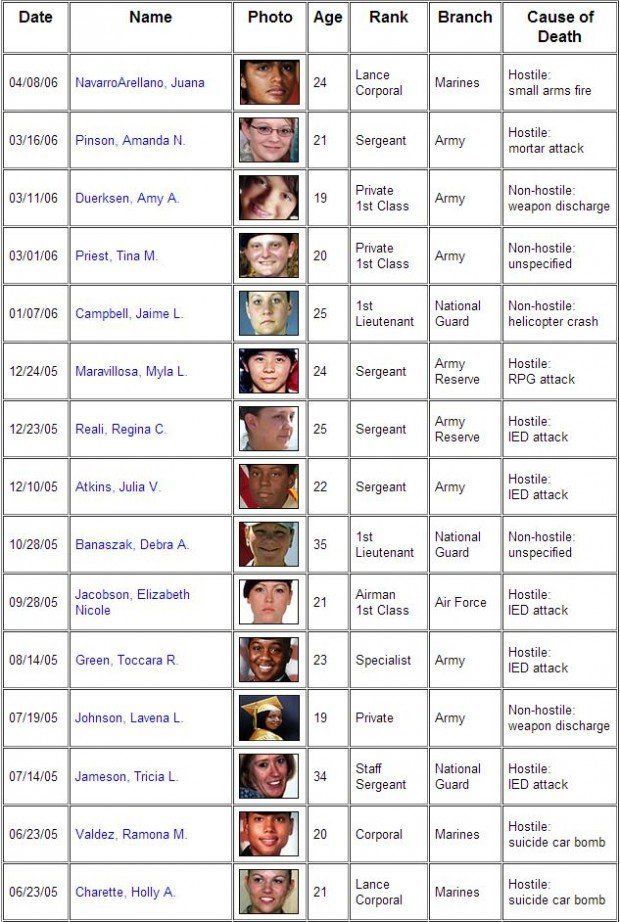


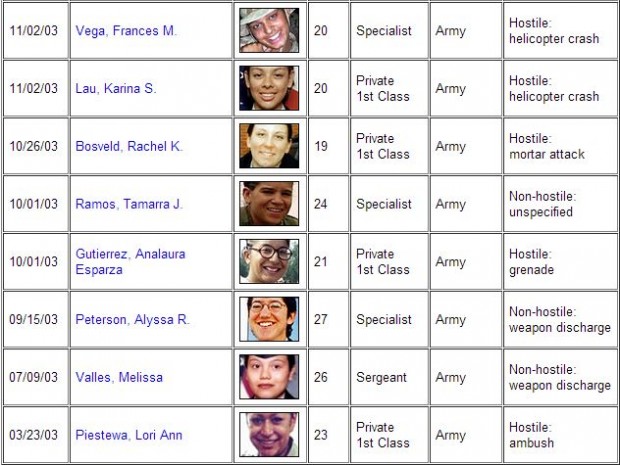


 They’re dead. It would be bad enough if they died of a heart attack or cancer. It would be even
worse if they died in a hunting or automobile accident. But these 2,963 Americans didn’t die from a disease or
an accident. Their deaths were unnecessary even as they were preventable. They didn’t die because they were
fighting terrorism or defending our freedoms or preserving the American way of life.
They’re dead. It would be bad enough if they died of a heart attack or cancer. It would be even
worse if they died in a hunting or automobile accident. But these 2,963 Americans didn’t die from a disease or
an accident. Their deaths were unnecessary even as they were preventable. They didn’t die because they were
fighting terrorism or defending our freedoms or preserving the American way of life. 
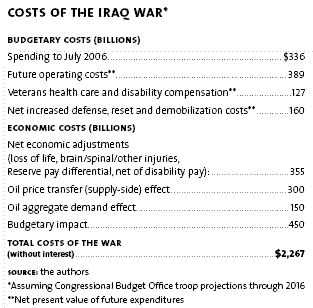 Just a year later, economists Linda Bilmes (Harvard) and Joseph E. Stiglitz (Columbia)
Just a year later, economists Linda Bilmes (Harvard) and Joseph E. Stiglitz (Columbia)



 Army Specialist
Army Specialist 